 06/03/2009 17:17 06/03/2009 17:17 |
|
| | | OFFLINE | Post: 3.643 | Registrato il: 23/11/2005
| Utente Master | |
|
OREMUS PRO PONTEFICE NOSTRO
The Holy Father requests the prayers of all the faithful so that the Lord may illumine the road for the Church. May the commitment of Pastors and the faithful grow, in support of the delicate and weighty mission of the Successor of the Apostle Peter as 'the guardian of unity' in the Church.
- Vatican Note, Feb. 4, 2009
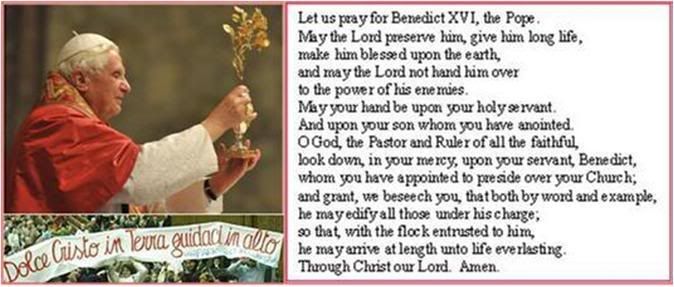
 Focusing on Africa: Papal trip to highlight challenges, possibilities
Focusing on Africa: Papal trip to highlight challenges, possibilities
By John Thavis
Catholic News Service
March 6, 2009
VATICAN CITY (CNS) -- Pope Benedict XVI opens a new chapter in his papal travels when he visits Cameroon and Angola in mid-March, a trip designed to highlight the church's message of hope on a continent beset by problems.
The visit March 17-23 will mark the first trip to Africa for a pope who has sometimes been described as Eurocentric, and it launches a series of important church events in 2009 focusing on the African continent.
For Pope Benedict, who is completing work on his first social encyclical, the trip will bring him closer to populations that are struggling daily against poverty, disease, corruption and armed conflict.
The global financial crisis is aggravating the burden on Africa's poor, and the pope's words on economic justice may offer a preview of the encyclical's themes.
The trip will unfold in two parts. In Cameroon, the pope will meet with bishops from the entire continent and hand-deliver the working document for the Synod of Bishops for Africa, which will take place in Rome in October.
The synod's theme is justice, reconciliation and peace, and it offers the pope a seemingly endless choice of topics for the seven speeches and homilies he'll deliver during his four days in Cameroon. Certainly he will touch on the ethnic and political tensions that have afflicted areas like Darfur in Sudan, Somalia and the Great Lakes region, and address the responsibilities of governments to promote dialogue, reduce corruption and respond to the human needs of their populations.
But rather than read a laundry list of challenges, the pope is more likely to zero in on the church's specific mission to be a community that heals, reconciles, forgives and encourages. The point is to move evangelization past the stage of bringing people into the church, and toward the goal of witnessing the Gospel in personal lives and the life of society.
One small but significant event in Cameroon will be the pope's visit to the Cardinal Paul Emile Leger Center, also known as the National Center for the Rehabilitation of the Handicapped. Even more than the synod document's thousands of words on pastoral strategy, this is where the pope sees the church eloquently expressing the faith and affecting lives, through charity in action.
In Cameroon, the pope will also meet with representatives of the country's Muslim community, which comprises about 22 percent of the population. At this encounter and in meetings with the African bishops, the pope is expected to emphasize the need for interfaith collaboration in tackling the moral and material problems of the continent.
In Nigeria, which borders Cameroon, attacks between groups of Christians and Muslims have left hundreds dead in recent months, although church leaders have emphasized that the violence has been primarily political and not religious.
The second part of the pope's trip takes him to the Angolan capital of Luanda for a series of encounters with political and government officials, church leaders and groups of the faithful. Here the emphasis is on the 500th anniversary of Christian evangelization in a country where the faith arrived with Portuguese missionaries in the late 15th century.
Angola is still recovering materially, politically and spiritually from a disastrous 27-year-long civil war that ended in 2002. The first postwar presidential elections are scheduled for later this year, and many Angolans believe the pope's visit could bring a spark of hope and encouragement to the country as it continues to reconcile and rebuild.
One key event will be the pope's Mass with young people in a soccer stadium in Luanda. Trip planners realize that the papal program in Africa will be largely consumed by meetings with groups of bishops, and they want to make sure the pope also has an opportunity to build bridges to younger generations.
On his last full day in Angola, the pope is taking time to meet with Catholic movements that promote women's welfare. The encounter underlines the church's concern about the many forms of continuing discrimination and violence against women in Africa, and it offers the pope a chance to make clear church teaching on gender equality.
Health care is a major concern in Angola and throughout Africa, and the AIDS pandemic in particular has devastated the continent. The disease now kills about 1.5 million people in sub-Saharan Africa each year, and has left more than 11 million children orphaned.
When it comes to the church and AIDS, the media often focus on the church's distrust of condoms as the answer to AIDS prevention. Pope Benedict has never mentioned the condom issue explicitly, but he spelled out his thoughts on AIDS in a talk to African bishops in 2005, noting that the church is in the forefront in treatment of this "cruel epidemic" and saying the "only failsafe way" to prevent its spread is found in the church's traditional teaching on sexual responsibility.
The German pope has made 10 trips so far, six of them to Europe (seven if one counts Turkey as part of Europe). This year his attention has turned to Africa. In addition to his March trip, the October synod and a major pre-synodal meeting of African church leaders in Rome, the pope has been meeting with groups of African bishops on their "ad limina" visits to report on their dioceses.
Under Pope John Paul II, the church in Africa grew by 160 percent and the number of priestly vocations tripled. Pope Benedict has spoken less of numbers and more about proper formation and a deepening of the faith -- in a sense, quality control. That's likely to be his focus in Cameroon and Angola, too.
What do African Catholics expect from the pope's visit?
Certainly they'll be listening to the pope as he speaks about their problems and the gifts they bring to the church. But African bishops say the importance of a papal visit is more than the sum of his speeches, sermons and liturgies.
"The Holy Father, wherever he goes, carries along with him this aura of God's representative on earth," Nigerian Bishop Michael Odogwu Elue of Issele-Uku told Catholic News Service.
"His nearness to us is almost equated with God's nearness to us. We do not talk about his political figure ... it's his spiritual presence that gives us a lot of encouragement and strength in the faith," he said.
Beyond the pope's message, many Africans will be looking for his blessing.
**********************************************************************
NB: I collapsed into one two of my posts in the preceding page to make way for David's comment on the US court ruling to appear on the same page as the report he was commenting on.
[Modificato da TERESA BENEDETTA 07/03/2009 11:51] |
|
 06/03/2009 17:20 06/03/2009 17:20 |
|
| | | OFFLINE | Post: 3.644 | Registrato il: 23/11/2005
| Utente Master | |
|
POPE 'WON'T VISIT SHOAH MUSEUM'
Benedict to skip WWII 'silence' pope exhibit
(ANSA) - Vatican City, March 6 - Pope Benedict XVI's trip to the Holy land in May will not take in Israel's Holocaust museum where WWII pope Pius XII is accused of silence on the Holocaust, the Israeli ambassador to the Holy See told ANSA Friday.
Speaking after reports that the Pius XII exhibit might be changed ahead of the May 8-15 trip, Ambassador Mordechai Levy said Benedict would attend a memorial ceremony at the Yad Vashem site but would not visit the museum itself.
Levy said the pope, accompanied by Israeli President Shimon Peres, would light a remembrance fire and make a speech. Earlier on Friday, Catholic sources in Jerusalem voiced hope the Pius 'silence' caption could be changed to avoid embarrassing Benedict.
They were speaking after the announcement of a debate on the controversial pope, who is on track to become a saint, at Yad Vashem on Sunday and Monday.
The symposium, which will take place largely behind closed doors, will look at Pius in the light of the latest historical evidence.
Organisers say the conference will see ''if there is something new or something which has to be completely revised'' in light of recent research by Jewish and Catholic scholars.
The Vatican has sought for years to persuade Yad Vashem to change or remove the caption which it considers defamatory. Pope John Paul II visited Yad Vashem in 2000 but the Pius caption was not an issue because it only appeared five years later when a new museum was unveiled.
In 2007, the Vatican ambassador to Israel, Archbishop Antonio Franco, refused to attend the annual Holocaust remembrance ceremony at Yad Vashem because of the caption.
NEW DOCUMENT LATEST IN VATICAN EFFORTS.
Vatican efforts to correct the record on Pius continued earlier this week when it publicised a newly discovered document urging Rome nuns to shelter anyone being sought by the Nazis in a bid to save his ''children,'' including Jews.
Father Peter Gumpel, the so-called 'postulator' of Pius's cause for beatification, told Vatican radio that a document uncovered by nuns in the Rome monastery of Santissimi Quattro Coronati urged that whoever was being ''persecuted'' be given hospitality.
The document, dated November 1943, lists 24 people who were given hospitality in the monastery of cloistered nuns in keeping ''with the wishes of the Holy Father''.
Gumpel said the document - together with a similar one sent to then bishop of Assisi, Monsignor Nicolini - proves beyond doubt that Pius did all he could to help Jews during the Nazi occupation of Italy.
The accusations by critics that he did nothing to prevent the infamous round-up of 1,022 Jews in the Rome Ghetto on October 16,1943 is ''an absolute falsehood,'' Gumpel said.
Referring to the beatification process - the final step towards sainthood - Gumpel said the paperwork was completed and was awaiting Pope Benedict XVI's signature.
Secretary of State Cardinal Tarcisio Bertone said recently that moves to make Pius a saint were the Vatican's business.
''The representation of Pius XII as indifferent towards the victims of the Nazis...or even as 'Hitler's Pope' (the title of a recent book) is outrageous and historically unsustainable,'' Bertone told a conference marking the recent 50th anniversary of Pius's death.
Bertone said the polemics - revived last October when a Jewish minister called plans to put Pius one step from sainthood ''unacceptable'' - were ''biased and ever less comprehensible''.
'DEFAMATORY LEGEND'.
Pius was the victim of ''a defamatory legend,'' Bertone said, reiterating a view expressed by Pius's supporters.
Jewish groups say the only way to settle the issue of Pius's wartime role is to open the Vatican's archives on the war years.
But officials have said it would take ''at least six to seven years'' to collate the thousands of files.
The International Jewish Committee for Interreligious Consultations met with Benedict in November to ask him to put off Pius's beatification until after the archives are available for study.
Benedict replied that he was ''seriously considering'' it, the Jewish group said.
Vatican sources later stressed the pope was answering a private question and not taking an official stance.
Benedict praised Pius at a Mass on the 50th anniversary of his death on October 9.
He reiterated that Pius saved the ''largest possible number of Jews'' by acting in silence to ''avert the worst''.
He told the mass that Pius's action had been recognised after the war by Jewish leaders including Golda Meir.
|
 07/03/2009 12:07 07/03/2009 12:07 |
|
| | | OFFLINE | | Post: 16.778 | Registrato il: 28/08/2005
| Utente Gold | |
|


March 7
 Saints Perpetua and Felicita, Martyrs (3rd cent,)
Saints Perpetua and Felicita, Martyrs (3rd cent,)
OR today.
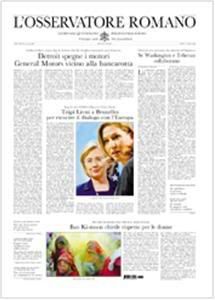
Again, no papal news in this issue. Main story: General Motors close to declaring bankruptcy
as an indicator of other dire economic news everywhere. Also, an unrealistic commentary
speculating on cooperation between the US and Iran; Israel's Tsipi Livini in Europe to repair
Israeli credentials with Europe in the wake of the Gaza offensive; and a demnad for women's
rights everywhere by the UN secretary-general.
THE POPE'S DAY
The Holy Father's Lenten retreat ended this morning. He gave brief concluding remarks after the final
meditation held after Lauds this morning.
Afterwards, he met in private audience with Cardinal Francis Arinze, emeritus Prefect of the Congregation for
Divine Worship, awho had preached the meditations at the just-concluded Lenten spiritual exercises.
NB: I will continue to be minimally present till mid-week next week.
[Modificato da TERESA BENEDETTA 07/03/2009 17:24] |
 07/03/2009 17:53 07/03/2009 17:53 |
|
| | | OFFLINE | | Post: 16.779 | Registrato il: 28/08/2005
| Utente Gold | |
|
 Since the Pope's message is brief, I've decided to take a break and translate it, especially as we have not 'heard' from him all week - other than that great Message for WYD, that is!
Since the Pope's message is brief, I've decided to take a break and translate it, especially as we have not 'heard' from him all week - other than that great Message for WYD, that is!
As he did in previous years, the Pope's remarks were addressed to the leader of the spiritual exercises - this year, Cardinal Francis Arinze, emeritus Prefect of the Congregation for Divine Worship, who offered reflections on the theme, "The priest meets Jesus and follows him".
The Pope's choice of Cardinal Arinze as this year's leader of the Lenten spiritual exercises for the Curia is significant on the eve of his first trip to Africa as Pope, which begins in 10 days.
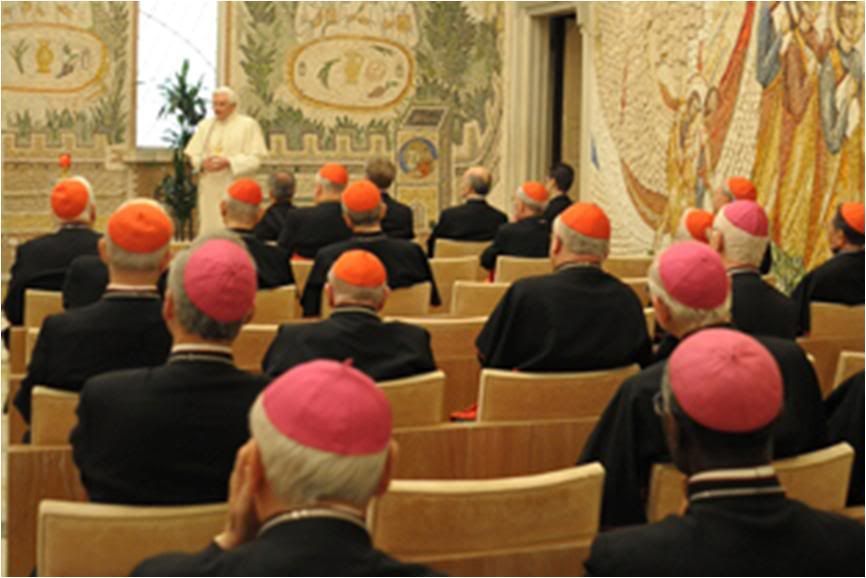 THE HOLY FATHER'S REMARKS
THE HOLY FATHER'S REMARKS
AT THE END OF THE WEEKLONG
LENTEN SPIRITUAL EXERCISES
Eminences,
Dear venerated brothers:
One of the beautiful functions of a Pope is to say 'Thank you'.
At this time, I would like, in the name of all of us, to say 'Thank you" from the heart to you, Eminence, for the meditations you gave us. They have guided, illuminated and helped us to renew our priesthood.
Your meditations were no theological acrobatics. You offered us none of those, but rather a healthy doctrine, the good bread of our faith.
Listening to your words brought to mind a prophecy of Ezekiel interpreted by St. Augustine. In the Book of Ezekiel, the Lord, the God who is a shepherd, tells the people: "I will lead my sheep to the mountains of Israel, to grassy pastures."
St. Augustine asks himself what these grassy pastures would be. He answers: The mountains of Israel, the grassy pastures, are Sacred Scripture, the Word of God that gives us true nourishment.
Your preaching was permeated by Sacred Scripture, showing great familiarity with the Word of God, read in the context of the living Church, from the Fathers to the Catechism of the Catholic Church, always contextualized in (Scriptural) readings and in the liturgy.
And that is how Scripture is present in its full relevance.
Your theology, as you told us, has not been an abstract one, but characterized by healthy realism. I admired and very much appreciated your concrete experience in 50 years of priesthood that you spoke about, and in the light of which you have helped us to concretize our faith.
You have given us the right words, words that are concrete to our lives, and for our behavior as priests. I hope that many will read your words and take them to heart.
You started with the always fascinating and beautiful account of the first disciples who followed Jesus. Still rather uncertain and timid, they asked, "Master, where do you live?" And his answer - which you interpreted for us, was: "Come and see".
In order to see, we have to come along, we must walk with and follow Jesus, who always precedes us. You have shown us where Jesus lives, where his dwelling is: in his Church, in his Word, in the most Holy Eucharist.
Thank you, Eminence, for your guidance. With new impetus and new joy, let us undertake the journey towards Easter.
I wish you all a good Lent and a happy Easter.
[Modificato da TERESA BENEDETTA 08/03/2009 11:11] |
 08/03/2009 11:25 08/03/2009 11:25 |
|
| | | OFFLINE | | Post: 16.780 | Registrato il: 28/08/2005
| Utente Gold | |
|

March 8
St. John of God
OR today.
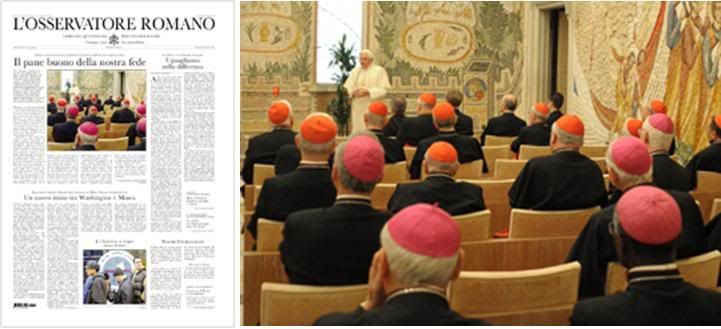
The Pope concludes Lenten spiritual exercises preached by Cardinal Arinze:
'The good bread of our faith'
Other Page 1 items: An editorial on the Church and the feminine revolution; a story touting 'new beginning' between Russia
and the USA after Hillary Clinton meets her Russian counterpart in Geneva; and the worsening unemployment picture in the USA.
There are a couple of inside-page stories anticipating the Holy Fahter's visit to the Campidoglio tomorrow.
THE POPE'S DAY
Angelus today - The Holy Father announced his trip to the Holy Land.
Simultaneously, the Vatican Press Office released this announcement:
Accepting invitations from the King od Jordan, the President of Israel, the President of
the Palestine National Authority, and the Assembly of Catholic Ordinaties in the Holy Land,
His Holiness Benedict XVI will make a pilgrimage to the Holy Land from May 8-15, visiting
Amman, Jerusalem, Bethlehem and Nazareth.
[Modificato da TERESA BENEDETTA 08/03/2009 16:26] |
 08/03/2009 16:00 08/03/2009 16:00 |
|
| | | OFFLINE | | Post: 16.782 | Registrato il: 28/08/2005
| Utente Gold | |
|

 Pope Benedict XVI announces
Pope Benedict XVI announces
Holy Land trip May 8-15
to pray for 'peace and unity'
By ARIEL DAVID

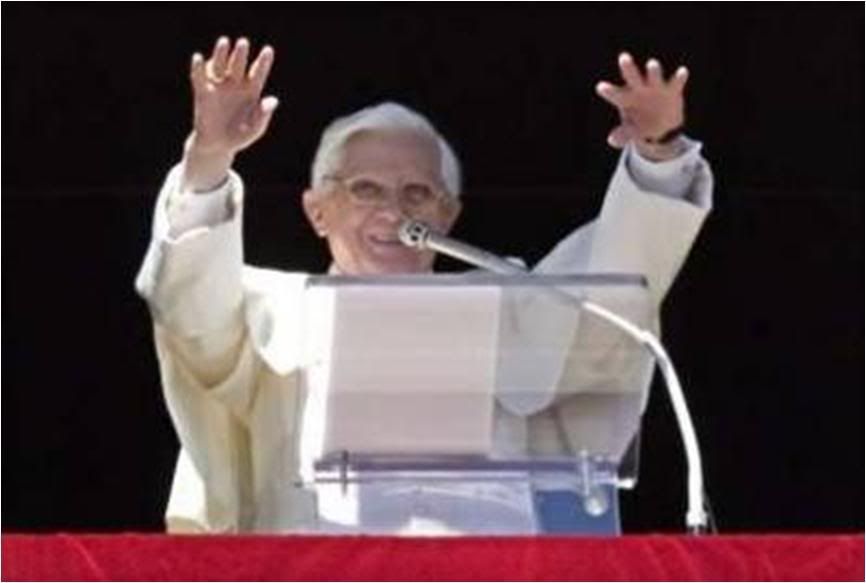
VATICAN CITY, March 8 (AP) — Pope Benedict XVI said Sunday he would visit the Holy Land from May 8-15 in the first papal trip to the area since 2000.
The visit would be the second official trip by a Pope to Israel.
Announcing the dates of the long-planned pilgrimage, the Pope said he would go to sites Jesus visited and would pray for "the precious gift of unity and peace for the Middle East and all of humanity."
Benedict told a crowd gathered in St. Peter's Square for the traditional noontime blessing that he was asking the faithful for their spiritual support for the Holy Land pilgrimage and a trip to Africa from March 17-23.
Benedict said the African trip would show "the concrete closeness of myself and of the Church to the Christians and the people of that continent, which is particularly dear to me."
The Pope will stop in Cameroon and Angola, meeting with local bishops, Muslim representatives and women's rights advocates.
The Pope's Mideast tour will touch Jordan, Israel and the Palestinian territories, with stops in cities including Amman, Jerusalem, Bethlehem and Nazareth, the Vatican said.
Though a detailed program has not yet been announced, officials in destination countries have said they expect Benedict to visit an Amman mosque, hold public Mass in Jordan and Nazareth and make a stop at the Yad Vashem Holocaust memorial in Jerusalem.
There has been only one other official visit by a Pope to the Jewish state, Pope John Paul II's pilgrimage in 2000. Pope Paul VI made an unofficial trip there in 1964.
Israeli President Shimon Peres, who invited Benedict to visit, called the trip "an important and thrilling event of the first order, that emanates a wind of peace and hope."
Benedict's pilgrimage comes at a time of strained relations between Israel and the Holy See.
Israel was offended when senior Vatican Cardinal Renato Martino said during Israel's recent military campaign to stop rocket fire from the Gaza Strip that Gaza resembled a "big concentration camp."
Ties were further rattled when the German-born Pope reinstated an excommunicated bishop who has questioned the extent of the Holocaust. Benedict later condemned the bishop's remarks and spoke out against anti-Semitism.
The two sides are also at odds over the legacy of the wartime pontiff Pius XII, who some historians say did not do everything in his power to prevent the Holocaust.
That dispute centers on a caption of a photo of Pius at Yad Vashem's museum that says he did not protest the Nazi genocide of Jews and maintained a largely "neutral position." The Vatican says Pius made every effort to help Jews and other victims through quiet diplomacy and wants the caption changed. [You would think the writer would mention here that Yad Vashem is hosting an international study session this week to study new documents that relate to Pius XII's wartime activities!]
Vatican-Muslim ties were also tested by a 2006 speech in which Benedict linked Islam to violence. Amid angry reactions from the Muslim world, expressed regret for any offense caused by his remarks.
Jordan will be the first stop on Benedict's Mideast tour. Bishop Francis Solikat, the papal nuncio in Amman, said the Pope's visit to the Hussein bin Talal mosque, the largest in the country, will be "another gesture on the part of the Holy Father to promote inter-religious dialogue, especially in Jordan."
The Pope will also stop at the site on the Jordan River where, according to tradition, Jesus was baptized, Solikat said.
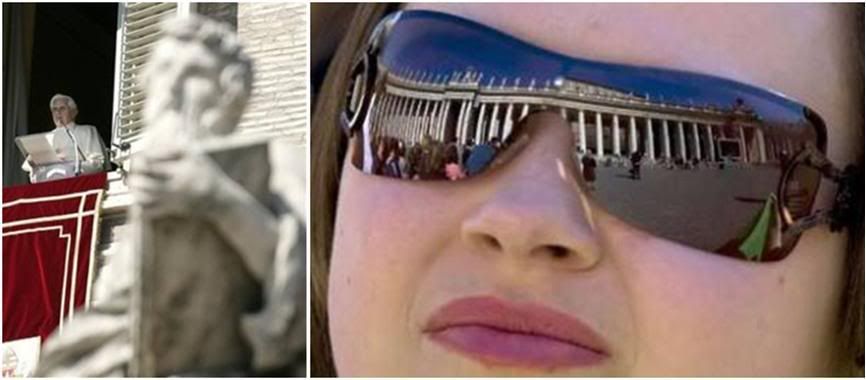
Church officials in Amman scheduled a news conference about the Pope's visit around the time of the Angelus for a timely announcement from the Pope himself.
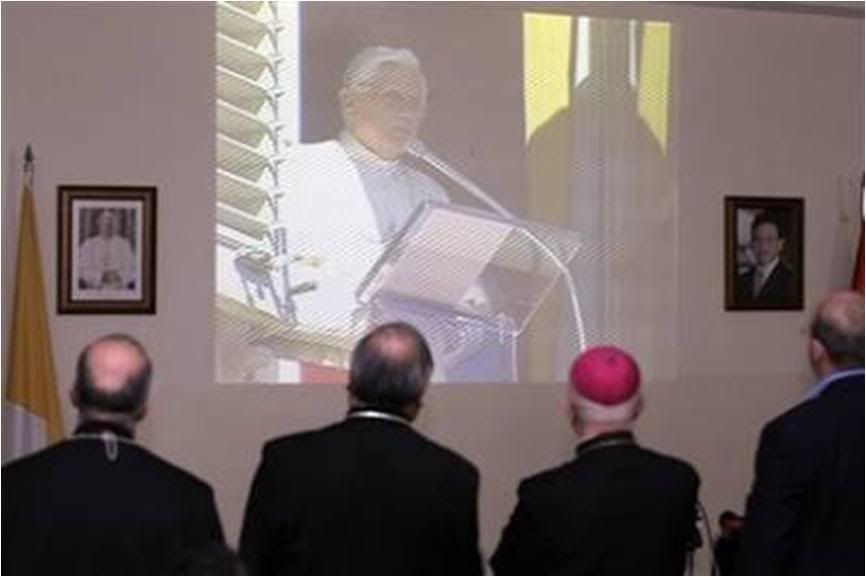 THE HOLY FATHER'S
THE HOLY FATHER'S
ANGELUS HOMILY & MESSAGES
Too bad the news reports ignore, as they usually do, the homily part of the Pope's Angelus message. Today, he gave one of the most beautiful and illuminating meditations I have heard on the Transfiguration - a meditation that in itself can be 'transfiguring' for the listener.
Here is a translation of the Holy Father's words at Angelus today:
Dear brothers and sisters:
In the past few days, as you know, I underwent spiritual exercises along with my co-workers in the Roman Curia. It has been a week of silence and prayer: the mind and the heart could be dedicated entirely to God, listening to his Word, and meditating on the mysteries of Christ.
To some degree, it was a bit like what happened to the apostles Peter, James and John when Jesus brought them with him to a high mountain, quite apart from everyone else, and while he prayed, he was 'transfigured': his face adn his figure became luminous, resplendent.
The liturgy reminds us of this famous episode today, the second Sunday of Lent (cfr Mk 9,2-10). Jesus wished that his disciples, in particular those who would be responsible for leading the nascent Church, might have a direct experience of his divine glory to help them face the scandal of the Cross.
In effect, when the time of Jesus's betrayal would come and Jesus retreated to pray in Gethsemane, he had near him the same,e Peter, James and John, asking them to watch and pray with him (cfr Mt 26.38). They were unable to do that, but the grace of Christ would sustain them and help them to believe in the Resurrection.
I wish to underscore that the Transfiguration of Jesus was substantially an experience of prayer (cfr Lk 9,28-29). Prayer, in fact, reaches its peak - and thus becomes a source of interior light - when the spirit of man adheres to God;s and their wills merge almost as to become one.
When Jesus went up the mountain, he immersed himself in teh contemplation of the Father's plan of love in sending him to the world in order to save mankind.
Next to Jesus, there appeared Elijah and Moses, ot indicate that the Sacred Scriptures concurred in announcing the mystery of his Pasch, and that is, that the Christ must suffer and die in order to enter into his glory (cfr Lk 24,24.46).
At that moment, Jesus saw the Cross looming before him, the extreme sacrifice that was necessary to liberate us from the dominion of sin and death.
And in his heart, he repeated yet again his 'Amen'. He said 'Yes, here I am; let your will of love be done, Father '.
And as it had been after his baptism in the Jordan, the signs of pleasure from God the Father came from heaven: light, which transfigured the Christ, and the voice that proclaimed 'the beloved Son" (Mk 9,7).
Along with fasting and works of mercy, prayer forms the weight-carrying structure of our spiritual life. Dear brothers and sisters, I call on you to find during this season of Lent prolonged moments of silence, possibly of retreat, in order to see your own life in the light of the Heaven;y Father's plan of love.
Let yourselves be guided in this more intense listening to God by the Virgin Mary. teacher and model of prayer. Even in the dense darkness of the passion of Christ, she never lost the light of her divine Son but kept it in her spirit. That is why we call her Mother of trust and of hope.
After the prayers, he said the following:
On today's date, March 8, we are invited to reflect on teh condition of women and to renew the commitment that always and anywhere, every woman may be able to live and manifest the fullness of her capacities, obtaining full respect for her dignity.
In this sense, the Second Vatican Council and the papal Magisterium have expressed themselves, particularly teh apostolic letter Mulieris dignitatem by the Servant of God John Paul II (Aug. 15, 1988).
More than documents, however, are the testimonies of the saints. Our age has had that of Mother Teresa of Calcutta: a humble daughter of Albania who became, through the grace of God, an example for all the world of the exercise of charity in the service of human promotion.
How many other women work every day, unpublicized, for the good of mankind and the Kingdom of God!
Today I assure my prayers for all women that they may always be respected in their dignity and valued for their positive potential.
Dear brothers and sisters, in the climate of more intense prayer that characterizes Lent, I entrust to your remembrance in prayer teh two apostolic trips that, God willing, I will be making soon.
Next week, from March 17-23, I will go to Africa - first to Cameroon and then to Angola - to show concretely my nearness and that of the Church to the Christians and other peoples of that continent which is particularly dear to me.
Then, from May 8-15, I will make a pilgrimage to the Holy Land to invoke the Lord, while visiting the places sanctified by his earthly passage, the precious gift of unity and peace in teh Middle East and for all mankind.
I count on the spiritual support from all of you so that God may accompany and fill with his graces all those whom I will encounter on these trips.
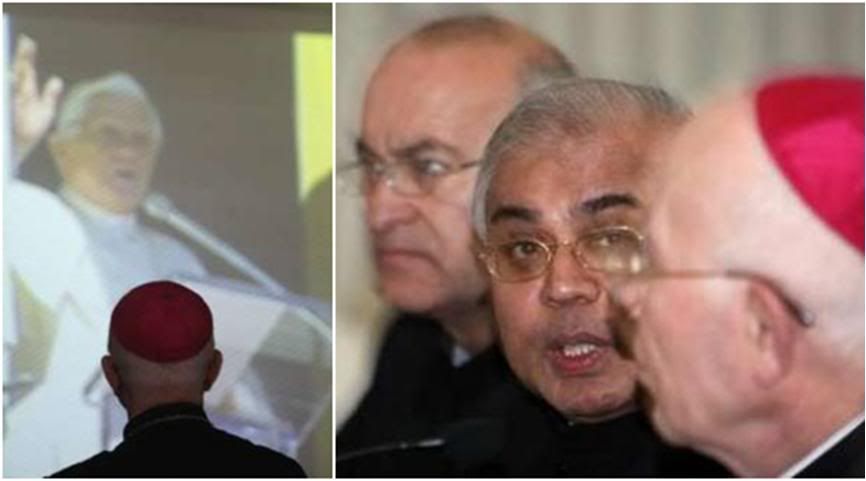 Right photo shows, rom right to left, Jordanian Bishop Selim Sayegh, Vatican ambassador to Jordan Bishop Fransis Shalikaf,and Jordanian Bishop Yaser Ayash at the Amman news conference earlier today.
Right photo shows, rom right to left, Jordanian Bishop Selim Sayegh, Vatican ambassador to Jordan Bishop Fransis Shalikaf,and Jordanian Bishop Yaser Ayash at the Amman news conference earlier today.
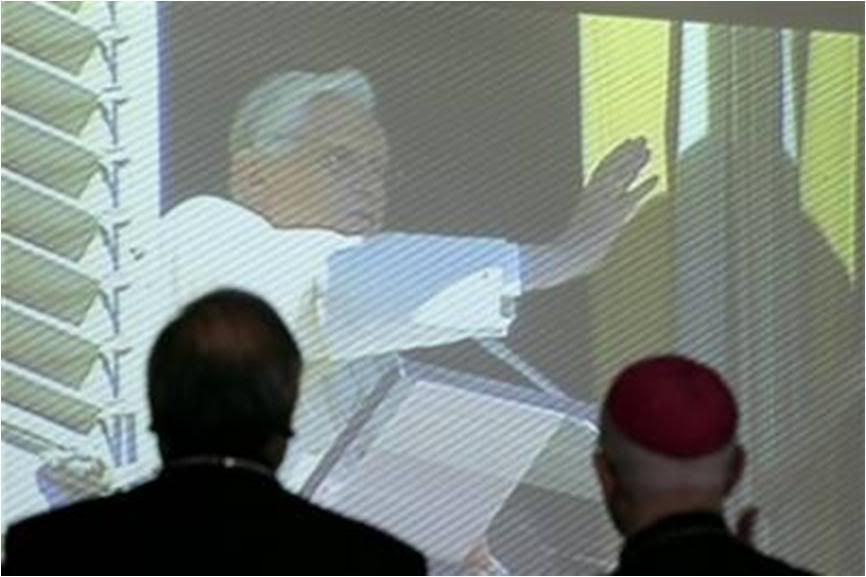 Iraqi envoy to Jordan says
Iraqi envoy to Jordan says
Pope is invited to Iraq

AMMAN, March 9 (AFP) – Iraqi leaders have invited Pope Benedict XVI to visit Baghdad, his envoy to Jordan said on Sunday, as the pontiff confirmed he will visit the Middle East in May.
"One thing I can tell you about the visit to Baghdad is that both President (Jalal) Talabani and the Prime Minister (Nuri) al-Maliki have personally invited the Holy Father to visit Iraq," the apostolic nuncio to Jordan, Archbishop Francis Assisi Chullikat, said.
"So the invitation is there, but we don't know exactly when that would happen, and the Holy Father eventually will give consideration to that," he told an Amman news conference.
"We can only hope and pray it will happen."
Pope Benedict told thousands of pilgrims gathered in St Peter's Square for weekly prayers on Sunday that he will visit Israel, the Palestinian territories and Jordan from May 8 to 15.
He said he would use the visit -- his first to the region -- to pray "for the precious gift of unity and peace for the Middle East and for all of humanity."
On the Jordan leg of the tour, he is expected to meet leaders of Iraq's Chaldean Catholic Church.
The church is Iraq's largest Christian denomination and includes among its followers former deputy prime minister Tareq Aziz who remains in US custody awaiting trial on charges of crimes against humanity.
[Modificato da TERESA BENEDETTA 08/03/2009 19:10] |
 08/03/2009 17:12 08/03/2009 17:12 |
|
| | | OFFLINE | | Post: 16.783 | Registrato il: 28/08/2005
| Utente Gold | |
|
 As I heve reached the limit of what I can translate today, I am using this as a place-saver for a couple of articles from the Italian press in preparation for the Holy Father's 'Roman holiday' tomorrow.
VISIT OF THE HOLY FATHER
As I heve reached the limit of what I can translate today, I am using this as a place-saver for a couple of articles from the Italian press in preparation for the Holy Father's 'Roman holiday' tomorrow.
VISIT OF THE HOLY FATHER
TO THE CAMPIDOGLIO
Monday, March 9, 2009
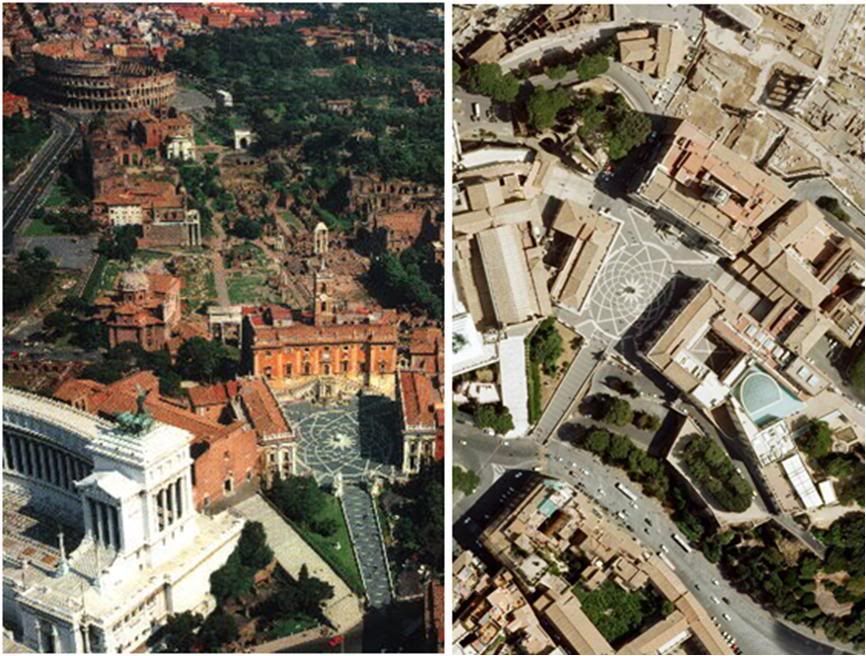 The Campidoglio (Capitoline Hill) with the ruins of the Roman Forum in the background, and the modern 'wedding-cake' memorial to Vittorio Emanuele, left foreground. A great stairway leads from the street level to the monumental piazza designed by Michelangelo. Right, satellite view.
PROGRAM
The Campidoglio (Capitoline Hill) with the ruins of the Roman Forum in the background, and the modern 'wedding-cake' memorial to Vittorio Emanuele, left foreground. A great stairway leads from the street level to the monumental piazza designed by Michelangelo. Right, satellite view.
PROGRAM
10:50 Arrival at Campidoglio (Area Sixtus IV).
The Holy Father will be welcomed by the Mayor of Rome, Gianni Alemanno, and his wife.
11:00 The Pope enters the Mayor's office and will appear on teh balcony overlooking the Roman Forum
11:10 The Pope greets city officials at the Tapestry Hall.
11:20 The Pope signs the Golden Book at the Hall of Flags.
11:30 Extraordinary Session of the Communal Council in the presence of the Holy Father at the Aula Giulio Cesare.
- Greeting by Mayor Alemanno
- ADDRESS BY THE HOLY FATHER
12.20 The Pope greets people assembled in the Piazza del Campidoglio
from the Loggia of the Palazzo Senatorio.
- GREETING BY THE HOLY FATHER.
12.30 Depart the Campidoglio for the Monastery of Santa Francesa Romana at Tor de' Specchi.
The Pope will be welcomed by Mons. Ernesto Mandara, Auxiliary Bishop for the central sector of the Diocese
of Rome and by Mother Maria Camilla Rea, President of teh monastery.
- Adoration of the Blessed Sacrament and veneration of teh remains of Santa Francesca Romana at the Choir Chapel
- Greeting from Mother Maria Camilla
- ADDRESS BY The HOLY FATHER
13.10 Departure from the monastery to return to the Vatican.
I did feel that the Holy Father's Angelus discourse today more than makes up for the 'lost week' (our loss). And one of his most endearing traits is his never-failing humility in asking for the prayers and the support of his flock - and that he will always have, but sometimes individuals can become too caught up in their personal problems that they may not remember to think of him in prayer.
BENEDICTUS QUI VENIT IN NOMINE DOMINI!
[Modificato da TERESA BENEDETTA 08/03/2009 17:20] |
 09/03/2009 16:32 09/03/2009 16:32 |
|
| | | OFFLINE | Post: 3.648 | Registrato il: 23/11/2005
| Utente Master | |
|
POPE IN HISTORIC VISIT TO CITY HALL
Benedict XVI second pope ever to address Rome council
(ANSA) - Rome, March 9 - Pope Benedict XVI on Monday made a historic visit to Rome city hall - the third pontiff ever to have done so after Paul VI and John Paul II.
In an extraordinary session in the Julius Caesar hall, Benedict became the second pope ever to have addressed the city council and assembly, eleven years after a speech by John Paul II.
In his address, Benedict - who is also bishop of Rome - called on the city to reject all forms of racism but also require its citizens to respect the law.
He said the city had become ''a multiethnic and multireligious metropolis'' where integration is ''sometimes arduous and complex''.
''I hope that Rome will find the strength to exact respect for the rules of civil cohabitation from everyone and to reject all forms of intolerance and discrimination,'' he said.
The pope acknowledged recent ''episodes of violence'' in the capital, referring to a string of rapes allegedly committed by immigrants which have resulted in a number of vigilante 'reprisals'.
Benedict said such acts of violence were born from ''spiritual poverty'' and said he hoped families and young people could reckon on a ''better future''.
The pope also noted the effects of the global economic crisis on the capital, saying that unemployment had led to families having difficulty in paying rent and mortgages and calling on individuals and institutions to redouble efforts to help those living in poverty.
Rome Mayor Gianni Alemanno said the pope's visit was ''a historic day for us all'' and said the council would institute an Observatory for Religious Freedom as well as a youth centre for troubled teenagers bearing the pope's name to mark the occasion.
During his visit to the city hall on Rome's Capitoline Hill, the pope stepped onto the balcony of the mayor's private office which overlooks the Roman Forum with Alemanno and the city's archaeology chief, Umberto Broccoli, but his view of the ancient ruins was hindered by strong winds, as a piece of his tunic repeatedly flapped in his face.
After addressing the assembly, the pope greeted members of the public who had turned out in smaller numbers than expected to watch the visit on a maxi-screen set up outside city hall in the historic square designed by Michelangelo.
''After living in Rome for so many years, I've become a little bit Roman,'' he told the crowd.
Following Benedict's visit, Alemanno rejected claims of an underwhelming public turn-out.
''There were actually a lot of people considering it was a Monday morning,'' he said.
|
 09/03/2009 16:35 09/03/2009 16:35 |
|
| | | OFFLINE | Post: 3.649 | Registrato il: 23/11/2005
| Utente Master | |
|
Pope urges Romans to "welcome" immigrants
Pope Benedict condemned "discrimination" at a council meeting with the mayor of Rome
Richard Owen in Rome
Times Online
March 9, 2009
Pope Benedict XVI today condemned "intolerance and discrimination" and urged residents of Rome to be more welcoming towards foreign immigrants during an historic visit to the Campidoglio, the Rome city hall on Capitol Hill.
Pope Benedict - only the third pontiff to attend a Rome city council meeting, after Paul VI and John Paul II - greeted a crowd of well-wishers, including a group of Roma gypsy children holding up a "No to Racism" banner, gathered on the Campidoglio piazza in front of the office of Gianni Alemanno, the mayor of Rome.
Since gaining office in elections nearly a year ago which marked a shift to the Right both nationally and locally Mr Alemanno, a former neo-Fascist youth leader, has cracked down on crime and illegal immigration, dismantling illegal gypsy camps in the grimmer Rome suburbs. A series of rapes in the capital has been blamed on immigrants - above all Romanians - and has led to a series of vigilante attacks on targets ranging from vagrants to Romanian-owned businesses.
The perceived crime wave by immigrants has also given rise to "neighbourhood watch" patrols by residents, some authorised by the local authorities but others mounted autonomously by right wing groups. Addressing a special session of the city council in the Julius Caesar council chamber the Pope - whose titles include Bishop of Rome - said Rome had always been "a welcoming city, especially over the past centuries".
Growing immigration however had made it a "multi-ethnic and multi-religious metropolis where sometimes integration is difficult and complex". He added: "Rome will find the force to ensure that everyone respects the rules of civil co-existence and to reject every form of intolerance and discrimination". It would do this if it relied on "its ancient roots, based on Christian faith" as well as the "rule of law," he said.
The pontiff did not refer directly to recent incidents such as an attack by 20 masked men who beat up four Romanians at a kebab restaurant near a suburban park where a 14-old girl was raped, allegedly by two Romanians. Police say DNA tests have yet to prove that two Romanian men arrested for the rape were involved in it.
Instead Pope Benedict referred to "episodes of violence deplored by all which manifest a deeper unease." He said that "our city, like the rest of Italy and humanity as a whole" was facing "unprecedented cultural, social and economic challenges". Rome was increasingly populated by "people who come from other nations and belong to different cultures and religious traditions".
Mr Alemanno said the city planned to establish a centre for teenagers from troubled backgrounds which would be named after Pope Benedict in honour of his visit and as a sign of the council's "commitment to integration".
The German-born Pope, who before being elected pontiff lived for two decades in the Borgo, the medieval quarter adjoining St Peter's, as the Vatican's head of doctrine, said he had become "a little bit Roman" himself.
The last visit by a pontiff to the Campidoglio was that of John Paul II in 1998. Relations between the Vatican and the city of Rome have been complex ever since the end of papal rule and the formation of a united Italy in 1870. Relations between Italy and the Holy See were formally settled by the Lateran Pact of 1929, which defined relations between the two sovereign states. However some secular-minded and even anti-clerical residents continue to resent the influence of the Vatican in Italian affairs.
|
 10/03/2009 00:57 10/03/2009 00:57 |
|
| | | OFFLINE | | Post: 16.787 | Registrato il: 28/08/2005
| Utente Gold | |
|

 THE BISHOP OF ROME
THE BISHOP OF ROME
AT THE CAPITOLINE
Translated from

At 10:40 Monday morning, the Holy Father Benedict XVI came to the Campidoglio for a visit. On his arrival the Pope - accompanied by his Vicar in Rome, Cardinal Agostino Vallini, among others - was greeted by the Mayor of Rome, Gianni Alemanno and his wife.
Afterwards, the Pope greeted the councilors and other city officials in the Tapestry Hall, and in the Hall of Flags, he signed the 'Golden Book' of the Commune of Rome.
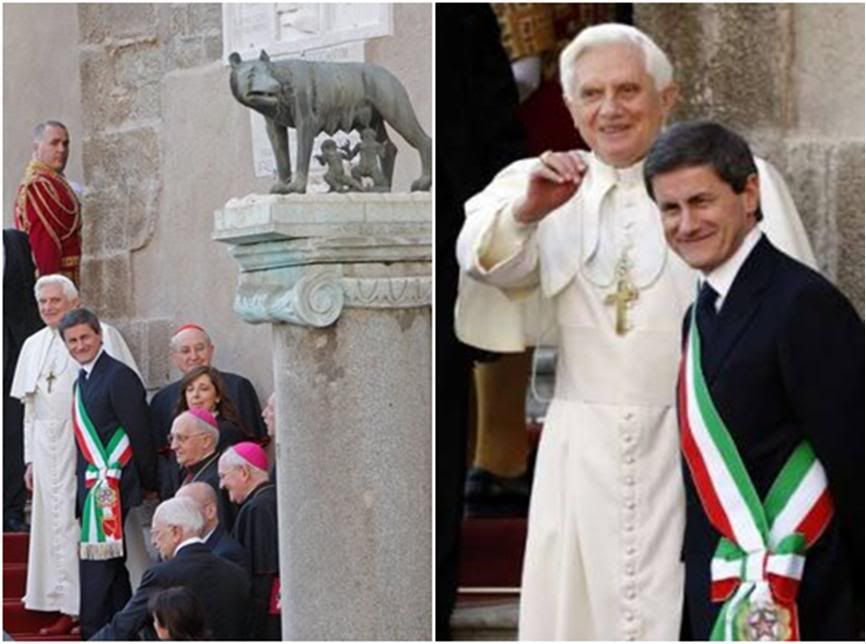
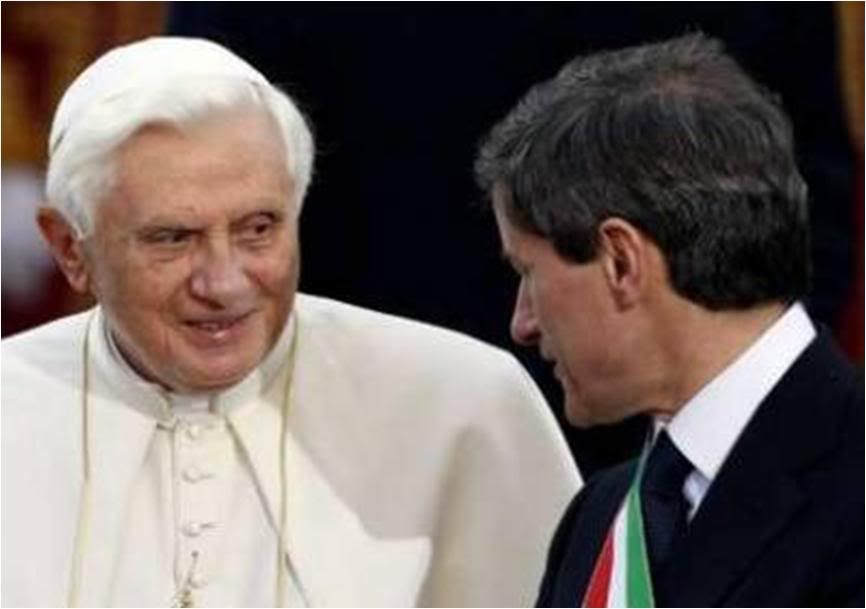
On the first floor of the Palazzo Senatorio [Rome's City Hall], the holy Father entered the Mayor's office and proceeded to the balcony that looks down on the Roman Forum.
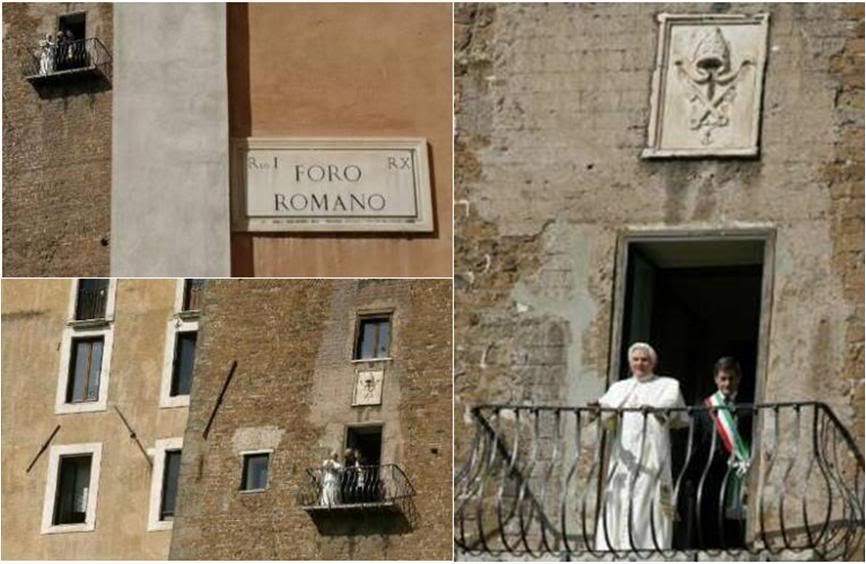
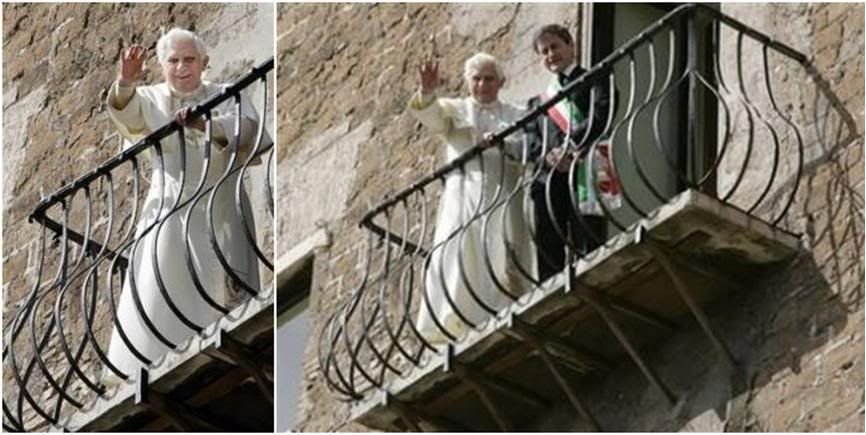
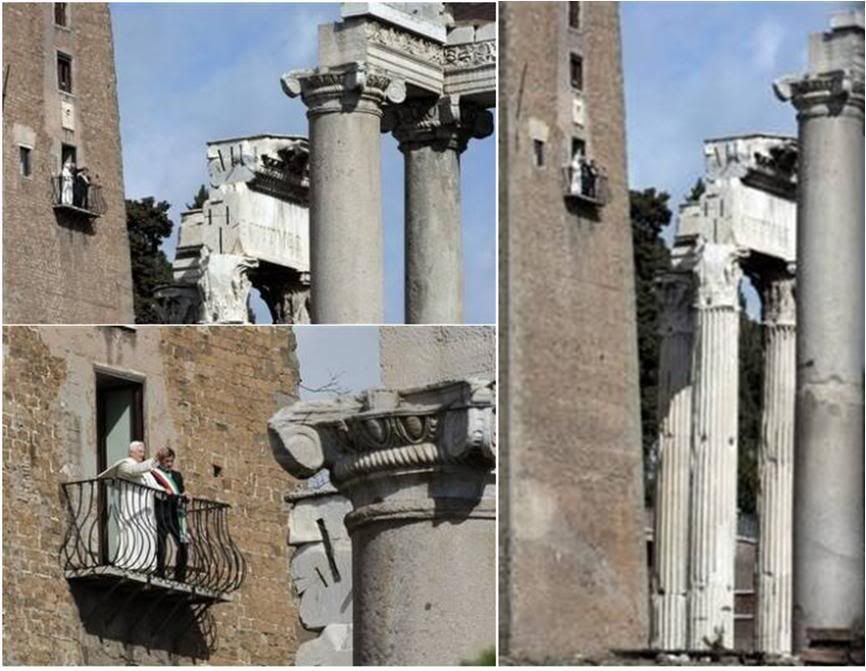
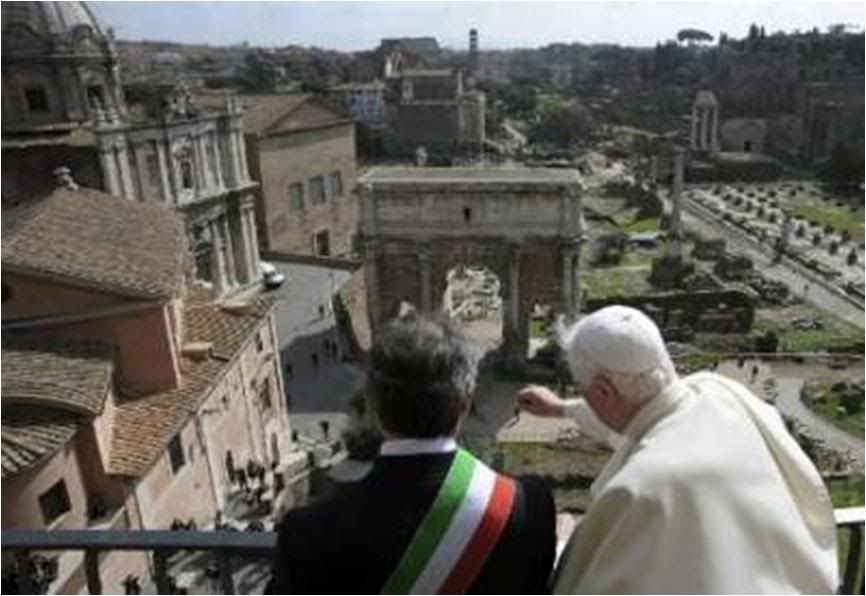
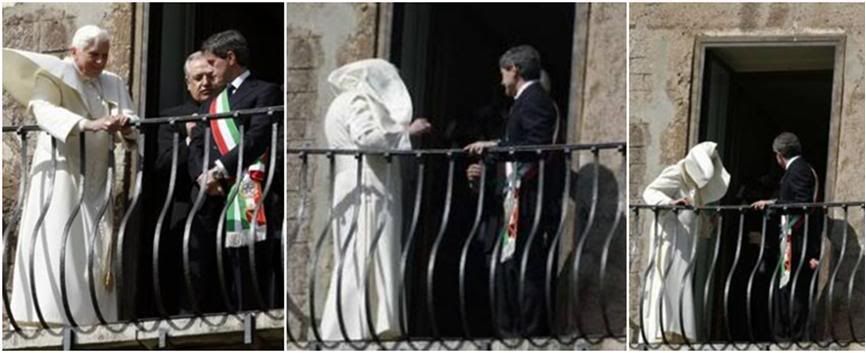
Then, in the Aula Giulio Cesare, the Hon. Marco Pomarici, president of the communal council, declared an extraordinary session of the Council open.
Following a greeting from Mayor Alemanno, the Holy Father addressed the city officials. Here is a translation of the address:
ADDRESS TO THE CITY COUNCIL
Mr. Mayor,
Mr. President of the Communal Council,
Ladies and gentlemen councillors of the Commune oF Rome.
Distinguished officials,
Dear friend!:
As we have been reminded, this is not the first time that a Pope has been greeted with such warmtn in this Palazzo Senatorio, and takes the floor in this solemn Council Hall, where the highest representatives of the city administration meet.
The annals of history record tHE brief visit of the Blessed Pius IX to the Piazza del Campidoglio after his visit to the Basilica of Ara Coeli on September 16, 1970.
Much more recent were the visits by Pope Paul VI on April 16, 1966, followed by that made by my venerated predecessor, John Paul II, on January 11, 1996.
They are acts which show the affection and esteem that the Successors of Peter, pastors of the Roman Catholic community and the universal Church, have always felt for Rome, center of Christian and Latin civilization, "welcoming mother of peoples"(cfr Prudenzio, Peristephanon, carme 11, 191) and "disciple of truth' (cfr Leo the Great, Tract. septem et nonaginta).
That is why it is with understandable emotion that I speak during the course of my visit today. I take the occasion to express above all, Mr. Mayor, my appreciation for the kind invitation to visit the Campidoglio that you extended to me at the start of your mandate as the prime magistrate of the 'Urbe' [city].
Thank you, as well, for the profound expressions with which you welcomed me in the name of your colleagues. I followed attentively the reflections offered by you, the Mayor, as well as the Council President, and understand thereby the determination of this administration to serve the city by aiming at its true and integral well-being - material, social as well as spiritual.
I extend my heartfelt greetings to the councilors of the Commune, to the representatives of the Italian government, to the authorities of Rome, and the entire Roman citizenry.
With my presence today on this hill, seat and emblem of the history and mission of Rome, I must renew my assurances of the paternal attention that the Bishop of the Catholic community feels not only for its members but for all Romans and all those who from various parts of Italy and the whole world, come to the capital for religious, touristic, or work reasons, or to stay here and integrate themselves into the fabric of the city.
I am here today to encourage the commitment, which is far frome asy, taken by you administrators in the service of this singular metropolis: to share the expectations and hopes of the residents and to listen to their concerns and problems, problems of which you have made yourselves the spokesmen in this place, which is the natural and dynamic center of plans that are going on in the 'construction site' of Rome in the third millennium.
Mr. Mayor, I saw in your address a firm purpose to work so that Rome may remain the beacon of life and freedom, of moral civility and sustainable development, promoted with respect for the dignity of every human being and his religious faith.
I hasten to assure you and your co-workers that the Catholic Church, as always, will not fail to give active support to every cultural and social initiative addressed at promoting the authentic good of every person and of the City in its entirety.
As a token of this collaboration I am offering the Compendium of the Social Doctrine of the Church with affection to the Mayor and other city administrators.
Mr. Mayor, Rome has always been a welcoming city. Especially in the last centuries, she has opened her universities, as well as her civil and ecclesiastical research centers to students from all parts of the world who, returning to their countries, are then called to play roles and functions of high responsibility in various sectors of society, as well as in the Church.
This, our city, like the rest of Italy and all mankind, now finds itself having to meet unprecedented cultural, social and economic challenges because of profound transformations and numerous changes that have come about in the past few decades.
Rome has become increasingly populated by people from other nations who belong to different cultures and traditions, and as a consequence, she now has the face of a multi-ethnic, multi-religious metropolis, in which sometimes integration is difficult and complex.
On the part of the Catholic community, it will never fail to contribute in order to find more adaptable modalities to protect the fundamental rights of persons in the face of the law.
As you stated, Mr. Mayor, I too am convinced that by drawing new lymph to the roots of its history, which was shaped by ancient law and Christian faith, Rome will find the strength to demand from all a respect for the rules of civil coexistence, and to reject every form of intolerance and discrimination.
Allow me also to note that the episodes of violence that have been deplored by everyone manifest a deeper unease. They are the signs, I would say, of a true spiritual poverty which afflicts the heart of contemporary man.
The elimination of God and his law, as a condition for realizing man's happiness, has not in fact achieved its objective. On the contrary, it deprives man of the spiritual certainties and hope that are necessary to face daily difficulties and challenges.
When, for instance, a wheel lacks its central axle, then its motor function fails. Similarly, morality does not fulfill its ultimate end if it does not pivot on the inspiration of God and submission to him, source and judge of every good.
In the face of the preoccupying weakening of human and spiritual ideals that had made Rome the 'model' of civilization for the entire world, the Church, through its parochial communities and other church associations, is engaged in detailed educational work intended to make others, particularly the new generations, rediscover the perennial values.
In the post-modern years, Rome should re-appropriate its deepest soul, its civic and Christian roots, if it wants to be the promoter of a new humanism which has man at its center, recognized in his full reality.
Man, when disconnected from God, would be deprived of his transcendent calling. Christianity is the bearer of a luminous message of the truth about man, and the Church, which is the depository of such a message, is aware of its own responsibility vis a vis contemporary culture.
How many more things I would like to say at this time! As the Bishop of the city, I cannot forget that even in Rome, because of the present economic crisis as I said earlier, the number is growing of those who, after losing their jobs, find themselves in precarious conditions, unable to meet the financial commitments they had assumed, for instance in acquiring a home or relocating.
Thus a concerted effort among the different institutions is needed to help those who live in need. The Christian community, through its parishes and charitable structures, is already engaged in sustaining on a daily basis so many families who labor to maintain a dignified life and, as has happened recently, are ready to work with the authorities who are willing to prosecute the common good.
Even in these cases, the values of solidarity and generosity, which are rooted in the heart of Romans, can be sustained by the light of the Gospel, so that everyone may once again feel responsible for the needs of the poorest, feeling themselves part of one family.
In effect, the more one can mature in every citizen the consciousness of feeling responsible in the first person for the life and the future of the residents of our city, the more confidence can grow that we can overcome the difficulties of the present time.
What to say of the families, of children and young people? Thank you, Mr. Mayor, that on the occasion of my visit, you have offered me a sign of hope for the youth, giving it my name, that of an old Pontiff who looks confidently to the youth and prays for them every day.
Families, the youth, can hope in a better future to the degree in which individualism makes way for feelings of brotherly collaboration among all the components of civil society and the Christian community.
May this work in construction be an impetus for Rome to to realize a social fabric of acceptance and respect, where the encounter between culture and faith, between social life and religious testimony, may work to form communities that are truly free and inspired by sentiments of peace.
A singular contribution can be made to this by the 'Observatory for Religious freedom" that is being formed, to which you referred just now,
Mr. Mayor, dear friends, at the end of my intervention, allow me to turn my attention towards our Lady with her Child who for several centuries has watched maternally over your work of civic administration in this hall.
May you all always be in agreement about service to our beloved city, to which the Lord has called me to exercise my episcopal ministry. On each of you I invoke from the heart the abundance of divine blessings,and for everyone I assure my remembrance in prayers. Thank you for your hospitality.
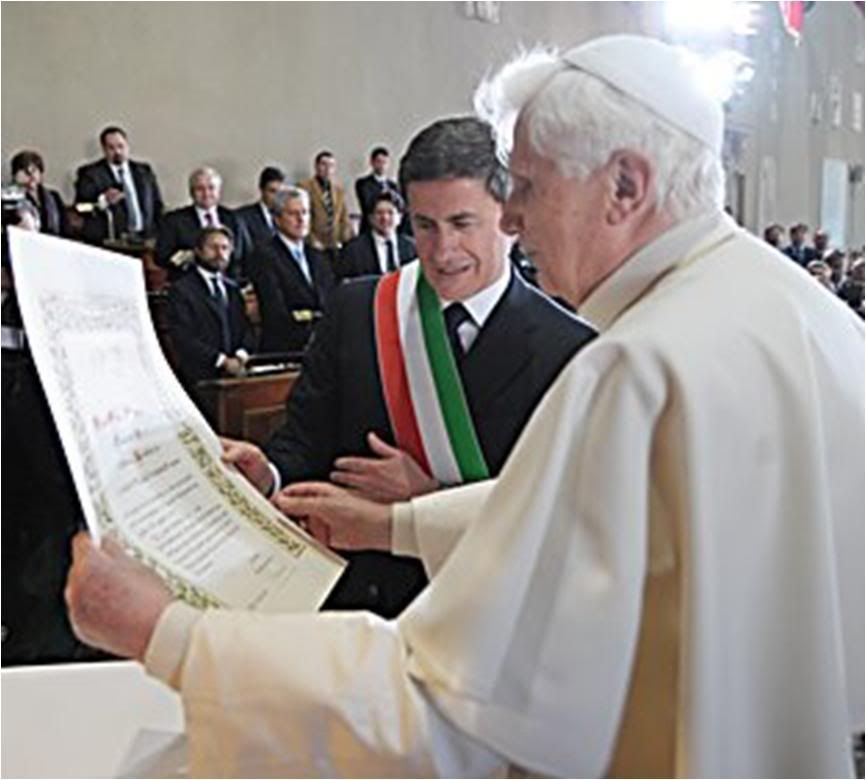 The Holy Father looks at the title to a Roman property where the city will put up a center named in his honor for assistance to young people with problems.
The Holy Father looks at the title to a Roman property where the city will put up a center named in his honor for assistance to young people with problems.
After his address to the city council, he went out to the Loggia of Palazzo Senatorio to greet the citizens gathered on he Piazza del Campidoglio. Among them were representatives of Roman volunteer associations, various immigrant groups and guests of the various community centers of Rome.
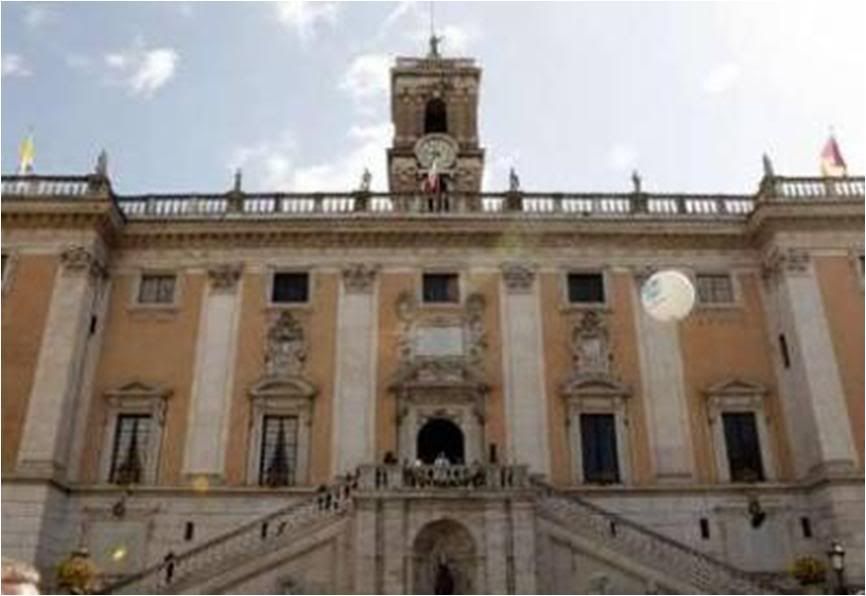
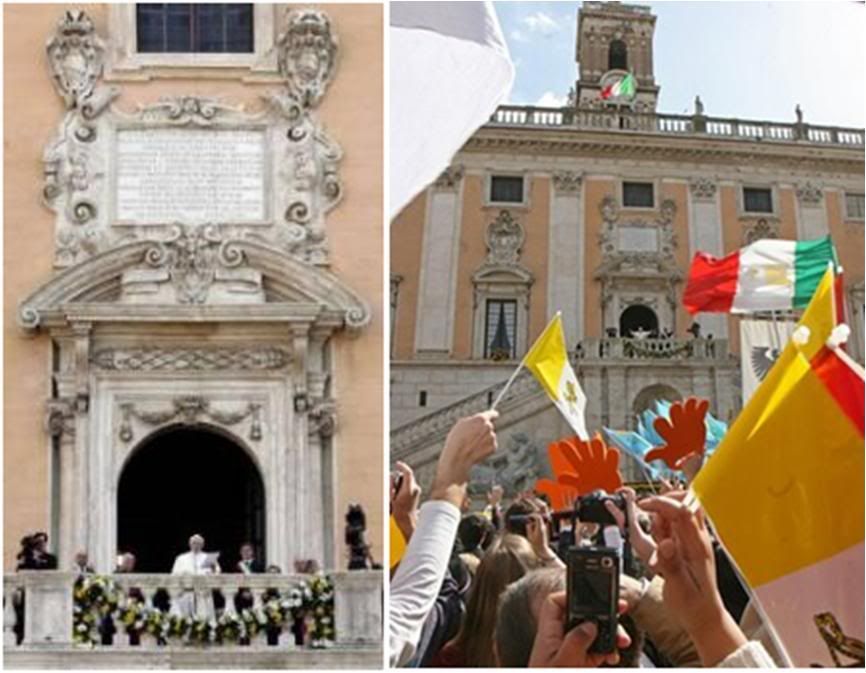
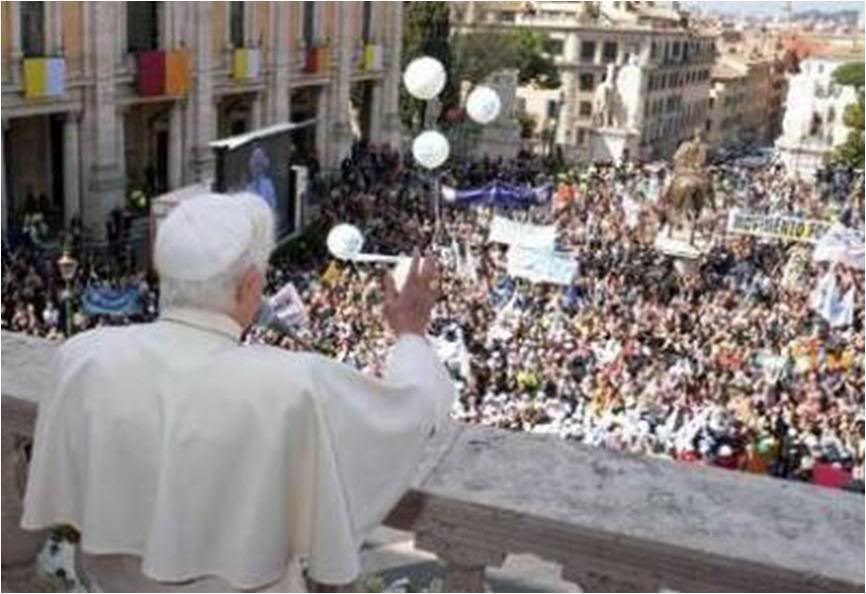
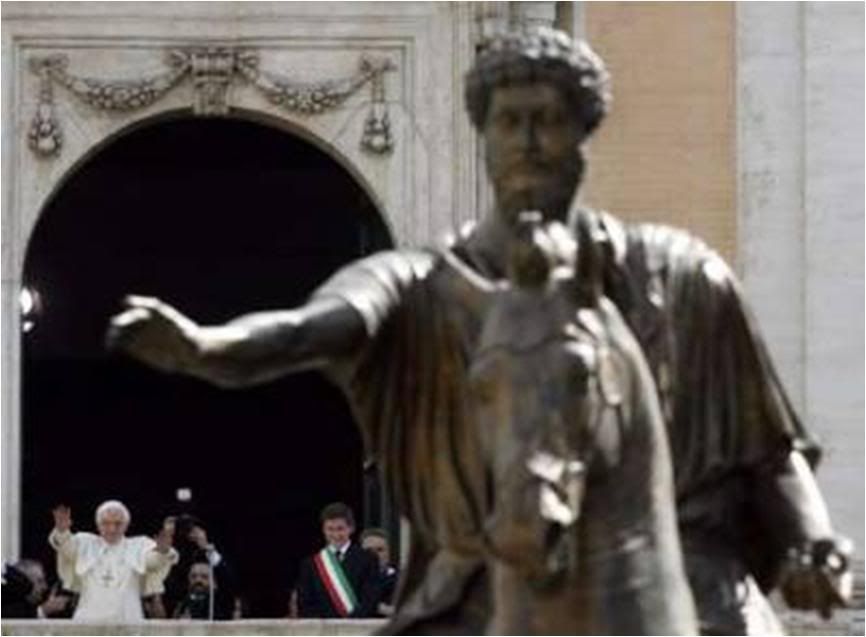
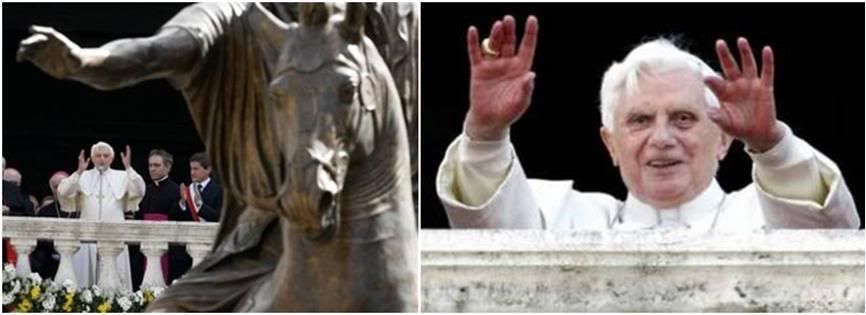
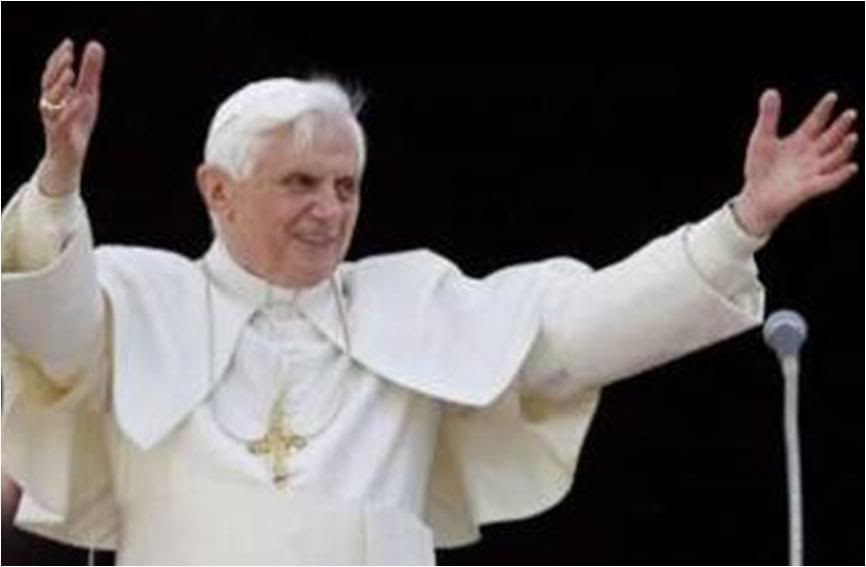 Here is a translation of the Holy Father's address to the people of Rome:
Here is a translation of the Holy Father's address to the people of Rome:
ADDRESS TO THE PEOPLE OF ROME
Dear brothers and sisters,
After meeting with the administrators of the city, I am very happy to greet all of you who are gathered in this Piazza del Campidoglio, towards which the colonnade, with which Bernini completed the splendid structure of the Vatican Basilica, reaches out as in an ideal embrace.
Having lived in Rome for so many years, I have become somewhat Roman, but I feel more Roman as your bishop. It is therefore with more vivid participation that I address, through each of you, all our fellow citizens whom you represent today to some degree: to families, to communities and parishes, to the children, to young people and the aged, to the disabled and the sick, to volunteers and social workers. to immigrants and pilgrims.
I thank the Cardinal Vicar, who is with me on this visit, and encourage and follow the commitment of all - priests, consecrated and the lay faithful - who work together actively with public institutions for the good of Rome, its suburbs and its neighboring areas.
Several days ago, while meeting with the parish priests and clergy of Rome, I said that the Roman heart is a 'heart of poetry', in order to underscore that beauty is almost "its privilege, its natural charism".
Rome is beautiful for its sntiquities, for its cultural institutiions and monuments which narrate history, for its churches and multiple art masterworks.
But Rome is beautiful above all for the generosity and saintliness of so many of its children who have left eloquent traces of their passion for the beauty of God, the beauty of a love that does not fade nor age.
Witnesses to this beauty were the Apostles Peter and Paul and the ranks of martyrs at the beginning of Christianity: In the course of centuries, many men and women,Roman by birth or by adoption, have given themselves in the service of young people, the sick, the poor and all who are needy.
I will limit myself to citing only a few: the deacon St. Lawrence, St. Francesca Romana, whose feast day we celebrate today, St. Philip Neri, St. Gaspare del Bufalo, St. Giovanni Battista De Rossi, St. Vincenzo Pallotti, Blessed Anna Maria Taigi, and the Blessed spouses Luigi e Maria Beltrami Quattrocchi.
Their example shows that when a person meets Christ, he does not remain closed in himself, but opens up to the needs of others, in every field of society, and places the good of all before his own interests.
We truly have need of such men and women in our own time, when not a few families, not a few young people and adults, are in precarious and even tragic situations - situations which can be overcome only together, as the history of Rome itself shows, which has known many other such difficult times.
I am reminded in this respect of a verse from the great Latin poet Ovid who, in one of his elegies, encouraged the Romans of his time: "Perfer et obdura: multo graviora tulisti" – support and resist: you have overcome situations that were much more difficult (cfr Trist., lib. V, el. XI, v. 7).
Beyond the necessary solidarity and the dutiful commitment of everyone, we can always count on the sure help of God who never abandons his children.
Dear friends, when returning to your homes, communities and parishes, tell everyone you meet that the Pope assures them of his understanding, of his spiritual nearness, and his prayers.
To everyone, especially the sick, the suffering, and those who are in the gravest difficulties, bring my remembrance and the blessing of God, which I now invoke on you through the intercession of Saints Peter and Paul, of San Francesca Romana, co-patron of Rome, and especially of Maria Salus Populi Romani - Mary. health of the Roman people. May God always bless and protect Rome and all its residents.
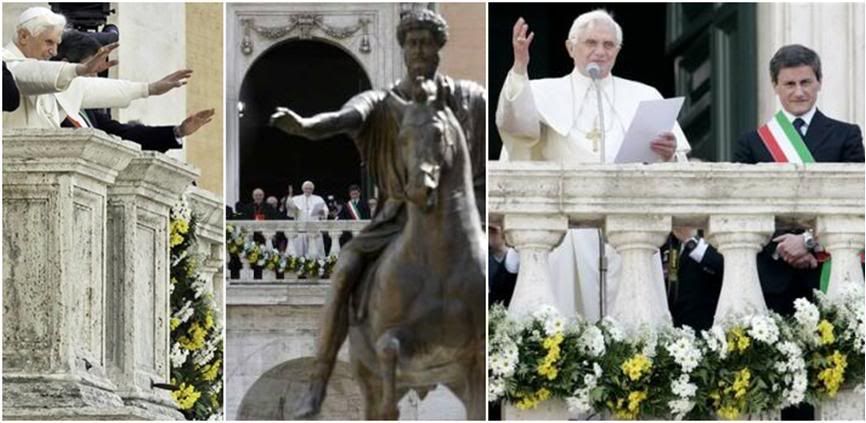
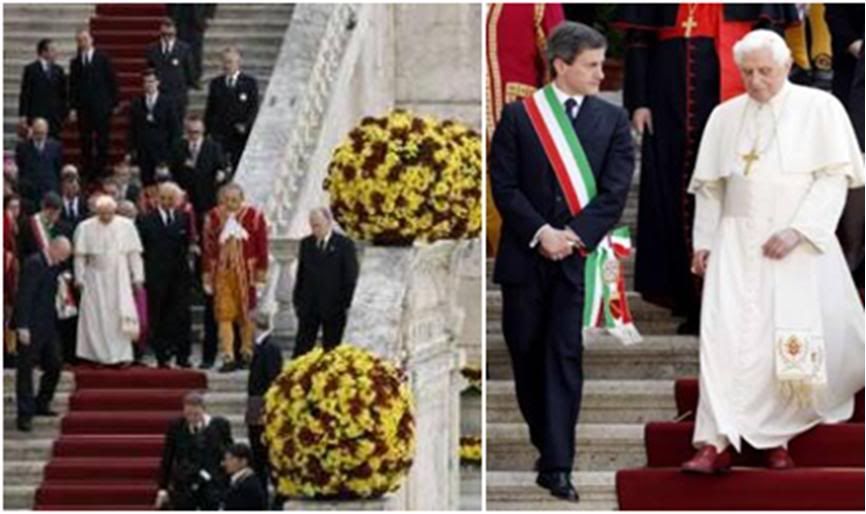
After addressing the crowd, the Pope went down the outer stairway of the Palzaazo Senatorio, said goodbye to his hosts, and proceeded to visit the nearby Monastery of Santa Francesca Romana.
*********************************************************************
What a lovely day for the Holy Father - the living icon of Rome - joining the monumental icons of the Eternal City, from Romulus and Remus, the city's legendary founders, and their she-wolf 'nursing mother', to the Forum of the Caesars and Marcus Aurelius via Michelangelo's civic masterpiece and Roman centerpiece in the Campidoglio... What a day of photo opportunities!
And just my luck to be away the whole day on such a momentous day. Have lots of catching up to do for the Forum. I've just barely survived Day-1 of my biennial ordeal with the state inspectors. I think it may take another 2-3 days, as we have two laboratory sites that must maintain certification.
[Modificato da TERESA BENEDETTA 10/03/2009 11:12] |
 10/03/2009 11:08 10/03/2009 11:08 |
|
| | | OFFLINE | | Post: 16.790 | Registrato il: 28/08/2005
| Utente Gold | |
|
RESERVED FOR STORES FROM THE ITALIAN MEDIA
ON THE VISIT TO THE CAMPIOGLIO |
 10/03/2009 11:35 10/03/2009 11:35 |
|
| | | OFFLINE | | Post: 16.791 | Registrato il: 28/08/2005
| Utente Gold | |
|


March 10
 St. Dominic of Savio
St. Dominic of Savio
Boy Saint (1842-1857)
OR for 3/9-3/10:
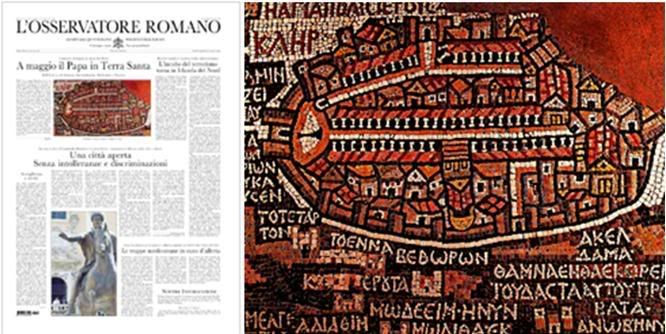
Announced at the Sunday Angelus:
The Pope in the Holy Land in May
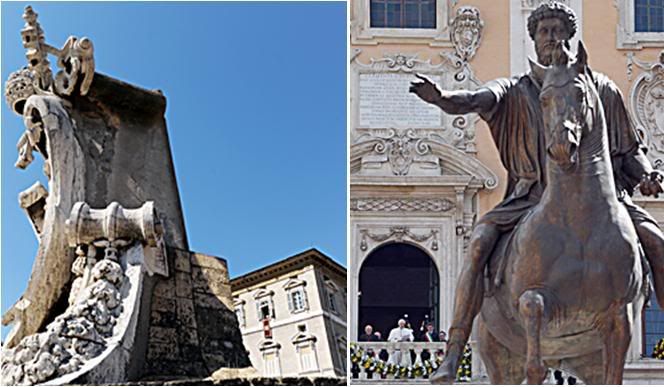
The Pope's coming pilgrimage took priority over the news of his visit to the Campidoglio yesterday, which merited
a front-page editorial. Other Page 1 stories: The nightmare of terrorism appears to be coming back to Northern
Ireland; and North Koreans on military alert because of the annual US-South Korean war games.
The Vatican has not posted its bulletin for the day, but since it is
Tuesday, the Holy Father will likely
not have a scheduled event.
[Modificato da TERESA BENEDETTA 12/03/2009 08:55] |
 10/03/2009 17:30 10/03/2009 17:30 |
|
| | | OFFLINE | Post: 3.654 | Registrato il: 23/11/2005
| Utente Master | |
|
Stem cell go-ahead puts Obama at odds with pope
By Philip Pullella
Reuters
Tuesday, March 10, 2009
U.S. President Barack Obama's lifting of restrictions on federal funding for human embryonic stem cell research puts him at odds with Pope Benedict and the American Roman Catholic Church.
After Obama signed the order on Monday, the Vatican and U.S. and Italian Church leaders condemned the move. One commentator said the test of "a real democracy" was its defence of the most defenceless.
Obama's executive order reversed and repudiated restrictions placed on the research by his predecessor, George W. Bush, freeing labs across the country to start working with the cells, which can give rise to any kind of cell in the body.
Cardinal Justin Rigali of Philadelphia, chairman of the U.S. Conference of Catholic Bishops' committee on pro-life activities, called Obama's decision "a sad victory of politics over science and ethics."
"This action is morally wrong because it encourages the destruction of innocent human life, treating vulnerable human beings as mere products to be harvested," he added.
The Catholic Church, other religious groups and pro-life advocates oppose stem cell research -- which scientists hope can lead to cures for diseases such as Alzheimer's and Parkinson's -- because it involves the destruction of embryos.
The Catholic Church supports adult stem cell research, which has made advances in recent years, because it does not involve the destruction of embryos.
An article in the Vatican newspaper on Tuesday said "a real democracy" should be founded on protection of human dignity in every phase of its existence.
MONEY OVER MORALS?
Monsignor Elio Sgreccia, a leading Vatican bioethics specialist, told Italian media: "The motive for this decision should be seen in the pressure for profits."
After the ban was lifted on Monday, U.S. shares in stem cell research companies soared. Researchers said companies that had been afraid to test the waters would probably leap in now that federal dollars can be used.
The issue will most likely be a main topic at the first meeting between the pope and Obama, expected to take place in July when the president is in Italy for a G8 summit.
In 2001, the late Pope John Paul II urged Bush not to allow stem cell research.
Last year a Vatican bioethics document said the human embryo has "from the very beginning, the dignity proper to a person."
Now that Obama has lifted the restrictions, Catholic theologians have been debating how embryonic stem cell research can be made "less morally repugnant," in the words of one theologian.
Father Thomas J. Reese, senior fellow at the Woodstock Theological Centre of Georgetown University, suggested several ways the Obama administration could find some middle ground.
Reese's suggestions include not creating embryos for the sole purpose of research but instead using only excess embryos produced at fertility clinics that are scheduled to be destroyed anyway.
He also said researchers should show that the research they are doing cannot be done with non-embryonic stem cells, and that research using embryonic stem cells should aim at advancing towards the goal of using only non-embryonic stem cells.
|
 11/03/2009 03:35 11/03/2009 03:35 |
|
| | | OFFLINE | | Post: 16.792 | Registrato il: 28/08/2005
| Utente Gold | |
|
 This is a belated post of 'news' that Pentin picked up from Paolo Rodari's speculative reports last week, amplified by a repetition of 'onventional wisdom' conclusions about the state of affairs of Vatican governance - without adding any new information or insight about the FSSPX and Wagner cases that are made the linchpin for the verdict of mismanagement, etc.
This is a belated post of 'news' that Pentin picked up from Paolo Rodari's speculative reports last week, amplified by a repetition of 'onventional wisdom' conclusions about the state of affairs of Vatican governance - without adding any new information or insight about the FSSPX and Wagner cases that are made the linchpin for the verdict of mismanagement, etc.
More unfortunately, what it does not pick up from Rodari is Benedict's cencept of the papacy as not primarily a function of governing the hierarchy but of confirming the faith of the simple.
Pope Benedict reportedly
seto to begin Curial shake-up
by Edward Pentin

Pope Benedict XVI is expected to approve a number of administrative changes at the Vatican over the next few weeks after months of internal mismanagement and avoidable controversies have left many Church officials saddened and perplexed.
Newsmax has learned that the personnel changes will affect the “second rung” of officials within the Secretariat of State – essentially the executive branch of the Vatican. Further changes among the top ranks of the Roman Curia are also likely over the next few months..
The news comes after two very public controversies which many Church observers say could have been avoided. The first related to Pope Benedict XVI’s decision to lift the excommunications of four bishops belonging to the breakaway Society of Pius X – a group which refuses to accept the reforms of the Second Vatican Council which took place in the 1960s.
One of them, Richard Williamson, denied the extent of the Holocaust in an interview broadcast on Swedish television just days before the Pope’s announcement. The Pope was unaware of Williamson’s controversial views which had been public knowledge for some years.
Days later, a further storm was generated after the Pope appointed an Austrian priest, Fr. Gerhard Maria Wagner, as auxiliary bishop of Linz. Fr. Wagner had once described Hurricane Katrina as God's punishment for the sins of New Orleans.
Priests in Linz announced that they would not accept him, and the Austrian bishops issued a statement criticizing the appointment. Fr. Wagner, regarded as an able, conservative priest, later expressed his wish not to accept the position and the Vatican later rescinded the appointment.
Vatican sources say both controversies over Williamson and Wagner could have been mitigated. Church commentators say weaknesses in internal management and communications are the main causes of these missteps.
The rescinding of Fr. Wagner’s appointment came as a particular disappointment to many in the Curia because of his orthodoxy. The appointment might have had a better chance of success had officials handled it better.
The majority of these internal communication and managerial problems are said to originate within the Secretariat of State which is responsible for coordinating all departments of the Roman Curia, and the Vatican’s relations with foreign governments.
As well as personnel changes among officials in the Secretariat of State, at least eight Curia cardinals are close to, or beyond, their normal retirement age of 75. The Pope is therefore expected to announce their replacements in the coming months.
Newsmax has learned that one cardinal, Castrillon Hoyos, will be asked to step down before Easter. The 79 year-old Colombian cardinal was responsible for pushing through the lifting of the excommunications of the four breakaway bishops. Sources say the commission he heads will probably be merged with the Vatican’s Congregation for Divine Worship in the coming months.
For the moment, Benedict XVI is unlikely to carry out more radical reorganization of the Curia, but restrict any reform to personnel changes.
The article makes it appear that Cardinal Castrillon is being saccpegoated at the Vatican. But he is 79, and his work at Ecclesia Dei from the time he was appointed by John Paul II was really to 'nurse' the FSSPX back into the fold. I believe he himself has mentioned in the past that eventually the 'one-pony' act of Ecclesia Dei would be absorbed by CDW.
[Modificato da TERESA BENEDETTA 11/03/2009 03:36] |
 11/03/2009 03:54 11/03/2009 03:54 |
|
| | | OFFLINE | | Post: 16.793 | Registrato il: 28/08/2005
| Utente Gold | |
|
 Pope Benedict XVI to visit
Pope Benedict XVI to visit
Dome of the Rock and Western Wall
By DIAA HADID

JERUSALEM, March 10 (AP) — Pope Benedict XVI will show solidarity with Jews and Muslims during his first papal trip to the Holy Land with visits to Jerusalem's Western Wall and the Dome of the Rock, the papal envoy in Jerusalem said Tuesday.
Benedict announced this week that he would visit in May. His presence could help ease the sometimes rocky relations between the Vatican and Israel, and between the Vatican and Muslims.
It will be his first official visit to the region since he became Pope in 2005.

Archbishop Antonio Franco, the papal nuncio in Jerusalem, said visits to key Jewish and Muslim holy sites would be on the Pope's agenda. The Dome of the Rock is one of Islam's most sacred shrines, and the nearby Western Wall is the holiest site where Jews are allowed to pray.
"The intent of the Holy Father's visit is to express his solidarity and closeness to the people of Israel and Palestine, and through them all the people of this region," Franco said.
Benedict will also visit Israel's Yad Vashem Holocaust memorial, meet with top Palestinian and Israeli leaders and make a stop in the West Bank town of Bethlehem, the traditional birthplace of Jesus.
The Pope will end his visit by celebrating Mass in Galilee — the area in northern Israel where Jesus lived and preached.
Franco said the Vatican has asked Israeli authorities to ease movement restrictions on Palestinian Christians from the blockaded Gaza Strip to allow them to attend parts of the pope's visit.
The papal envoy said Benedict's tour will be a religious pilgrimage, not a political mission. Still, the visit could help mend strained relations between Israel and the Roman Catholic Church.
Ties were rattled recently when Benedict tried to reinstate an excommunicated bishop who denied the Holocaust. Benedict condemned the bishop's remarks, spoke out against anti-Semitism and called off the reinstatement until the bishop satisfies his demands.
The controversy came shortly after a senior Vatican Cardinal, Renato Martino, described the Gaza Strip as a "big concentration camp" during Israel's fierce military assault on the blockaded territory in January. The offensive was meant to halt rocket fire into Israel.
The two sides also disagree over the legacy of the wartime pontiff Pius XII, who some historians say did not do everything in his power to prevent the Holocaust or limit its scope.
"We are trying to clarify the issues," Franco said.
Benedict will also meet the top Muslim official in the Holy Land, Grand Mufti Mohammed Hussein, who will accompany the pope into the Dome of the Rock shrine.
Vatican-Muslim ties were strained by a 2006 speech in which Benedict linked Islam to violence. Amid angry reactions from the Muslim world, he expressed regret for any offense caused by his remarks.
Franco said they asked Israeli authorities allow two busloads of Palestinian Christians from Gaza to attend the pope's Mass in Bethlehem.
Local Christian officials said they expected at least 40,000 people to attend the Galilee Mass, which will take place on a hilltop outside the northern Israeli city of Nazareth.
Palestinian Christians are a tiny, diminishing minority in the Holy Land, their community whittled away by low birthrates and emigration.
[Modificato da TERESA BENEDETTA 11/03/2009 21:54] |
 11/03/2009 13:13 11/03/2009 13:13 |
|
| | | OFFLINE | | Post: 16.795 | Registrato il: 28/08/2005
| Utente Gold | |
|


March 11
 St. John Ogilvie
St. John Ogilvie
Scottish martyr and Jesuit (1579-1615)
OR today.
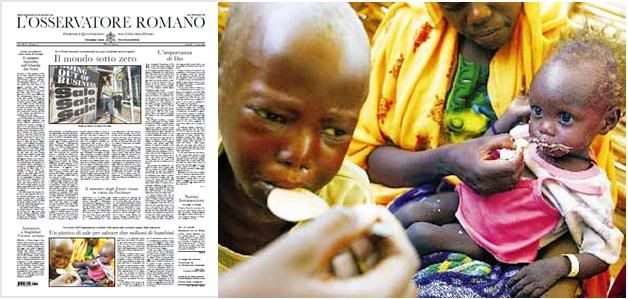
There ia a front-pahe commentary on the importance of God in the life of men today, as articulated by
Benedict XVI yesterday during his visit to the Campidoglio. Other Page 1 stories: the needless deaths
from dysentery among the poor children of Africa, for which a little salt and sugar in clean water with
a dash of zinc is a simple remedy that could save two million babies a year, says the WHO; the IMF says
the world domestic product in 2009 will be in negative territory; anti-British terrorism resumes in Northern
Ireland; and 30 killed in a new terrorist attack in Baghdad.
THE POPE'S DAY
General audience today - The Holy Father's only GA in March. He leaves for Africa next Tuesday.
His catechesis was on St. Boniface, apostle to the Germans.
The Vatican press director, Fr. Federico Lombardi briefed newsmen on the Africa trip, and announced
that tomorrow, the Vatican will release the text of the 'Letter of His Holiness Benedict XVI to
the Bishops of the Catholic Church on the remission of excommunication of the four bishops
consecrated by Archbishop Lefebvre'.
The text will be distributed in Italian, German, French, English, Spanish and Portuguese at 10 a.m.
tomorrow with an embargo till 12 noon.
{However, Andrea Tornielli on Il Giornale reported it first in today's issue, and so does Il Foglio, with
the Italian text of the letter. As the bishops have already received the letter, apparently, the news was
leaked by one of the bishop recipients in Italy. Later today, Frankfuerter Allgemeine Zeitung published
the full text in German, the language in which the Pope originally wrote the letter.]
[Modificato da TERESA BENEDETTA 12/03/2009 08:48] |
 11/03/2009 16:36 11/03/2009 16:36 |
|
| | | OFFLINE | Post: 3.655 | Registrato il: 23/11/2005
| Utente Master | |
|
Pope writes letter about Holocaust denier
By FRANCES D'EMILIO
March 11, 2009
VATICAN CITY (AP) — Pope Benedict XVI has written to bishops worldwide to explain the church's much-criticized handling of the case of a Holocaust-denying bishop, whose excommunication was recently lifted by the pontiff.
The explanation is contained in a letter in several languages that will be released by the Vatican's press office Thursday.
In announcing the letter Wednesday in a brief statement, the Vatican gave no details about the handling of the case of British-born Bishop Richard Williamson, who in a TV interview in January denied that 6 million Jews were killed in the Holocaust.
Rome daily Il Foglio said that the pope acknowledges in the letter that the Vatican made "mistakes" in the handling of the entire case.
The pope's bid to explain the case comes only a few days after Benedict confirmed that he would visit Israel in May as part of a pilgrimage to the Holy Land.
Vatican-Jewish relations have been already complicated by the church's defense of World War II Pope Pius XII, whom Benedict has hailed as a "great" churchman. Some Jewish groups and others say Pius didn't do enough try to stop the Holocaust while pontiff during World War II, while the Holy See insists Pius XII used quiet diplomacy to try to help Jews.
Williamson told Swedish TV that about 200,000 or 300,000 were murdered but that none was gassed.
The interview was granted shortly before Williamson's excommunication was lifted by Benedict, who is anxious to bring ultraconservative faithful loyal to the anti-modernization movement of the late Archbishop Marcel Lefebvre back into the church's mainstream fold.
Benedict's lifting of the excommunication of Williamson sparked outrage among Jewish groups and in Israel as well as among Catholic bishops in Germany.
Besides Williamson, Benedict also lifted the excommunication of three other bishops who broke with the Vatican to follow Lefebvre's ultraconservative movement.
Il Foglio said, without citing sources, that the pope writes that the Vatican should have been aware of Williamson's Holocaust-denying statements being carried on the Internet.
The pontiff also reportedly faults the Vatican for not explaining its actions on Williamson in a "sufficiently clear" way, according to Il Foglio, a small conservative-leaning daily.
Last month, Williamson apologized for the "hurt" that his remarks caused, but didn't recant what he said. The Vatican has called that apology inadequate.
Bowing to criticism by Jewish groups, historians and others, the Vatican demanded on Feb. 4 that Williamson "absolutely and unequivocally distance himself" from his Holocaust denial.
After the furor, Williamson was ordered to leave Argentina, where he had been living, and returned to his native Britain.
State prosecutors in Germany have opened a probe into whether Williamson broke German laws against Holocaust denial.
|
 11/03/2009 16:45 11/03/2009 16:45 |
|
| | | OFFLINE | Post: 3.656 | Registrato il: 23/11/2005
| Utente Master | |
|
Here is more detail about the pope's letter.
POPE ADMITS MISTAKES IN BISHOPS ROW
Vatican failed to research Holocaust denier on Internet
By Fiona Winward
(ANSA) - Vatican City, March 11 - Pope Benedict XVI has admitted to making ''mistakes'', including not checking the Internet, when he lifted the excommunication of a Holocaust denier and three other ultra-traditionalist bishops.
In a personal letter to the world's Catholic bishops leaked by two Italian dailies (Il Foglio and Il Giornale) Wednesday, the pope says he wishes to ''contribute to peace within the Church'' by clarifying events surrounding the rehabilitation of the four breakaway bishops in January - a move which caused a rift between Jews and within the Church.
The pope refers to an ''avalanche of protests'' from Catholics following the rehabilitation, which he says has caused polemics ''of a vehemence unheard of in a long time''.
The Vatican said Wednesday that Benedict's letter will be officially presented on Thursday.
According to the leaks, Benedict says in the letter that the first ''mistake'' was the Holy See's failure to learn that British bishop Richard Williamson was a Holocaust denier by not checking the ''Internet'', where his comments were posted. Williamson recently reiterated his belief that there were no gas chambers and that only 300,000 Jews were killed by the Nazis, not six million.
Following tension with the Jews over the matter, the Vatican said the pope had no knowledge of these comments when he rehabilitated the bishop.
Benedict says in his letter that from now on the Vatican will pay greater attention to the Internet as an information source, Il Foglio said.
The second ''mistake'' was that of a ''not sufficiently clear'' manner of explaining the bishops' rehabilitation, the leaks report the pope as saying.
The lifting of their excommunication was ''personal'' and does not imply the canonical recognition of the ultra-conservative Society of Saint Pius X (SSPX), to which the bishops belong.
Benedict explains that SSPX will only be recognised if - during negotiations - the society accepts the Second Vatican Council, over whose liberal reforms the society originally split with Rome.
The pope defends his decision to rehabilitate the bishops within a context of Christian unity, explaining that one must ''have at heart the unity of believers'' in a world where ''God is disappearing from the horizon of men''.
Il Foglio said that in his letter Benedict criticises SSPX for ''many unpleasant things - arrogance, self-importance and unilateralism'', but says he has also received a series of ''moving declarations of gratitude'' from some members of the society, which includes 491 priests worldwide.
POPE 'SADDENED' BY CATHOLICS' REACTIONS.
Il Giornale reported that Benedict says he is ''saddened'' by the fact that Catholics have acted with ''hostility'' towards him over the affair.
''For this reason I am very thankful to our Jewish friends who helped to clear up the misunderstanding promptly and re-establish an atmosphere of friendship and trust''.
After initial tensions with Jews over Williamson's rehabilitation, the Holy See worked hard to defuse the situation and Jewish leaders said they were satisfied after the pope issued an explicit condemnation of Holocaust denial.
Polemics within the Church have continued, however, with Swiss bishops earlier this month voicing ''deep concern'' over the bishop's rehabilitation, saying it had prompted more Catholics to leave the church.
The head of the Bishops Conference, Kurt Koch, told the Swiss news agency ATS that the decision was taken ''with too little preparation'' and its announcement was given with too few details.
According to Wednesday's leaks, the pope in his letter announces that the Pontifical Commission Ecclesia Dei, which was responsible for healing relations between the Holy See and SSPX, will be merged with the Congregation for the Doctrine of Faith in order to involve a wider section of representatives in any eventual reconciliation.
|
 11/03/2009 18:42 11/03/2009 18:42 |
|
| | | OFFLINE | Post: 3.657 | Registrato il: 23/11/2005
| Utente Master | |
|
And more details....
Pope admits Holocaust denier affair was mishandled
By Philip Pullella
VATICAN CITY (Reuters) - Pope Benedict has written an "anguished" letter to Church leaders admitting the case of a Holocaust-denying bishop was mishandled and warning the Church risked "devouring itself" with internal squabbles.
In the letter addressed to the world's bishops, which the Vatican will release on Thursday, the pope also says he was pained by Catholics' criticism of him and that the Vatican could have foreseen problems if it had used the Internet more.
It is extremely rare in Church history for a pope to have to explain his actions to his bishops after the fact and to acknowledge that things went wrong.
"The letter is very personal, very anguished, very pained but very honest," said an Italian bishop who received it and discussed it on the condition that he remain anonymous.
The pope says the affair unleashed a storm of "vehemence" and hurt him deeply, particularly because much of the criticism came from Catholics.
On January 24, Benedict lifted the excommunication of Richard Williamson and three other bishops to try to heal a 20-year-old schism that began when they were thrown out of the Church for being ordained without the permission of Pope John Paul II.
Williamson said in an interview broadcast several days earlier that he believed there were no gas chambers and that no more than 300,000 Jews perished in Nazi concentration camps, rather than the 6 million accepted by most historians.
Williamson's comments and the pope's decision to lift the excommunication caused a deep rift in Catholic-Jewish relations. The decision was condemned by Holocaust survivors, some Catholics, Israel's Chief Rabbinate, world Jewish leaders and German Chancellor Angela Merkel.
CHURCH MUST USE INTERNET
The Vatican said at the time it did not know that Williamson was a Holocaust denier but critics said a simple Internet search would have found he had made such statements.
"Doesn't the Vatican know about Google?" one prominent Catholic critic said at the time.
In the letter, the pope says he was told after the crisis exploded that better use of the Internet would have revealed some of the problems. He says he "draws the lesson" and adds that in the future the Vatican must "pay more attention to this source of information."
The pope says he could not have foreseen that the Williamson affair would overshadow his intention of bringing unity back to the Church by lifting the excommunications of the bishops who belong to the Society of St Pius X.
He also says the Vatican did not sufficiently explain what it was trying to do by lifting the excommunications. At the time, several senior Vatican officials complained publicly that he had kept them out of the loop.
The pope also thanks those Jews who helped restore a climate of inter-religious trust.
The pope says he reflected deeply on the controversy and uses a quote from the Bible in which St Paul warns that the Church risks "devouring" itself through internal bickering.
He is both charitable and stern with the SSPX, saying that while his intention was to bring good people back into the fold, some of its members act in an "arrogant" way and make comments discordant with Church teaching.
The Vatican says before the SSPX can be fully readmitted into the Church, it must accept the teachings of the 1962-1965 Second Vatican Council which urged respect for other religions.
Williamson, a Briton, has so far not met the Vatican's demands that he recant.
|
 11/03/2009 22:32 11/03/2009 22:32 |
|
| | | OFFLINE | | Post: 16.796 | Registrato il: 28/08/2005
| Utente Gold | |
|

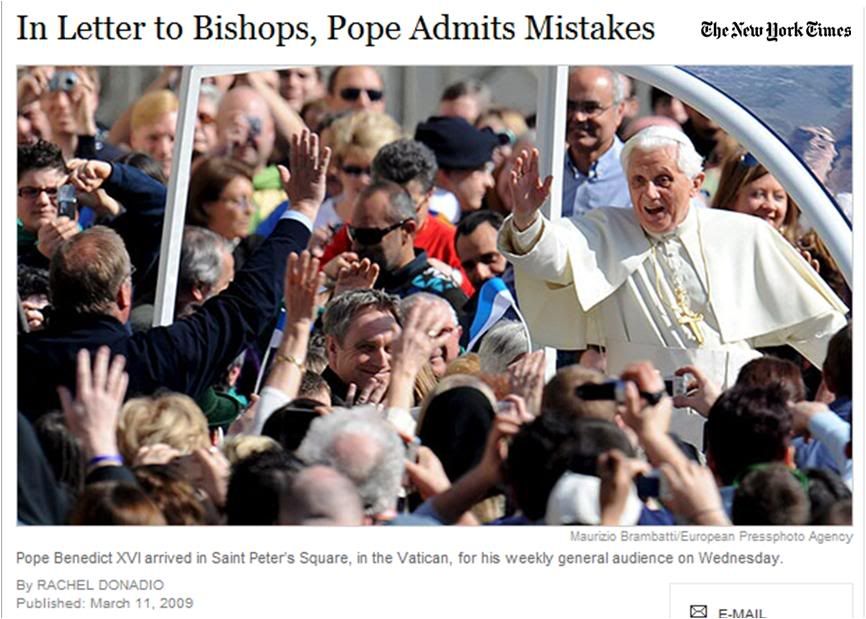
MADRID — Pope Benedict XVI has written an unusually personal letter to bishops worldwide explaining why he revoked the excommunication of a Holocaust-denying bishop and admitting mistakes in how the Vatican handled the case.
The letter, which the Vatican will release Thursday, is a further attempt to calm the waters after Benedict pardoned four schismatic bishops, including Richard Williamson, who in a television interview aired in January said that there were no Nazi gas chambers.
The revocation provoked worldwide outrage and caused Catholics and Jews alike to question Benedict’s commitment to ecumenism and the reforms of the Second Vatican Council.
In passages of the letter that appeared on Wednesday in the Italian newspaper Il Foglio, the Vatican admitted “mistakes” in handling the case, and said in the future it would pay more attention to how news spreads over the Internet.
A YouTube video of Bishop Williamson’s television interview, in which he denies the Holocaust, was widely available online in the days before the Pope lifted the excommunications in late January.
The four belong to the ultra-conservative Society of St. Pius X. They had been excommunicated by Pope John Paul II after being ordained without a papal mandate, causing the only formal schism in the church.
In passages from the Pope’s letter posted Wednesday on the blog of a veteran Vatican reporter, Andrea Tornielli, Benedict said he considered revoking the excommunication “a modest act of mercy” toward the bishops, whose ordinations were “valid but illicit.”
“Instead,” Mr. Tornielli quotes the letter saying, “it suddenly appeared something completely different: as the denial of reconciliation between Christians and Jews.”
The blog posting said the Pope wrote that he had been “saddened” that “even Catholics, who should have been better able to understand things,” instead seemed poised with “a hostility ready for the attack.”
He added that he thanked “the Jewish friends who quickly helped remove the misunderstandings and to reestablish the atmosphere of friendship and trust.”
The Vatican spokesman, the Rev. Federico Lombardi, said he had no comment on the letter ahead of its official publication.
In May, Benedict will make his first papal visit to the Holy Land, with stops expected in Jordan, Israel and the Palestinian territories.
In news accounts this week, Archbishop Antonio Franco, the Apostolic Nunzio to the Holy Land, said Benedict would not enter the Holocaust museum at Yad Vashem in Jerusalem because it has a contentious plaque criticizing Pope Pius XII for not doing enough to help save Jews during the Holocaust.
The legacy of Pius is a main sticking point in Vatican-Jewish relations. Benedict, like other popes, has said Pius worked “secretly and silently” to save Jews.
Reverend Lombardi said that the Pope would visit the Holocaust memorial at Yad Vashem, as John Paul II did on his historic visit to Israel in 2000, but that a museum visit had never been on the table.
The Pope is also expected to visit Al Aqsa Mosque in Jerusalem, Reverend Lombardi said.
On Thursday, Benedict is expected to meet a delegation from the chief rabbinate of Israel at the Vatican.
 How can one not be overwhelmed - with love and admiration and awe - at the humility and wisdom of a Pope who has done something unprecedented and historic, something so momentous one needs time to process it all properly!
How can one not be overwhelmed - with love and admiration and awe - at the humility and wisdom of a Pope who has done something unprecedented and historic, something so momentous one needs time to process it all properly!
Emerging back into the world this afternoon, the news greeted me and I have just spent an hour reading up what I can about it, including Frankfuerter Allgemeine Zeitung's publication of the Pope's original German text.
Indeed, God broke the mold when he decided to endow one Joseph Ratzinger with the gifts that would make him the Universal Pastor and Holy Father of the Church that he is... Already, I have reams of fantastic material from the foreign media to translate...and it is interesting to note the tone taken so far by the English news reports, in which the initial reports make it appear that it was focused on an oversight regarding the 'Holocaust denier' rather than what the formal title says it is!
Let me just quote for now how the redoubtable and ever-reliable Andrea Tornielli opened his 'scoop' report this morning about the Pope's letter: "It is a text that is detailed, beautiful, humble, and at the same time, powerful....". (For some reason, most English reporters and commentators hardly ever comment on the quality of the Pope's prose, which is very germane to who he is and to his Papacy.)
Thanks to Benefan, the Anglophone take on the news has been promptly reported, and I think we can all wait till the official English version is released tomorrow.
Meanwhile, I must take a look at what the Pope said at the GA today and try to regain some semblance of order in my Forum routine....
[Modificato da TERESA BENEDETTA 12/03/2009 14:26] |
|
|
|
|